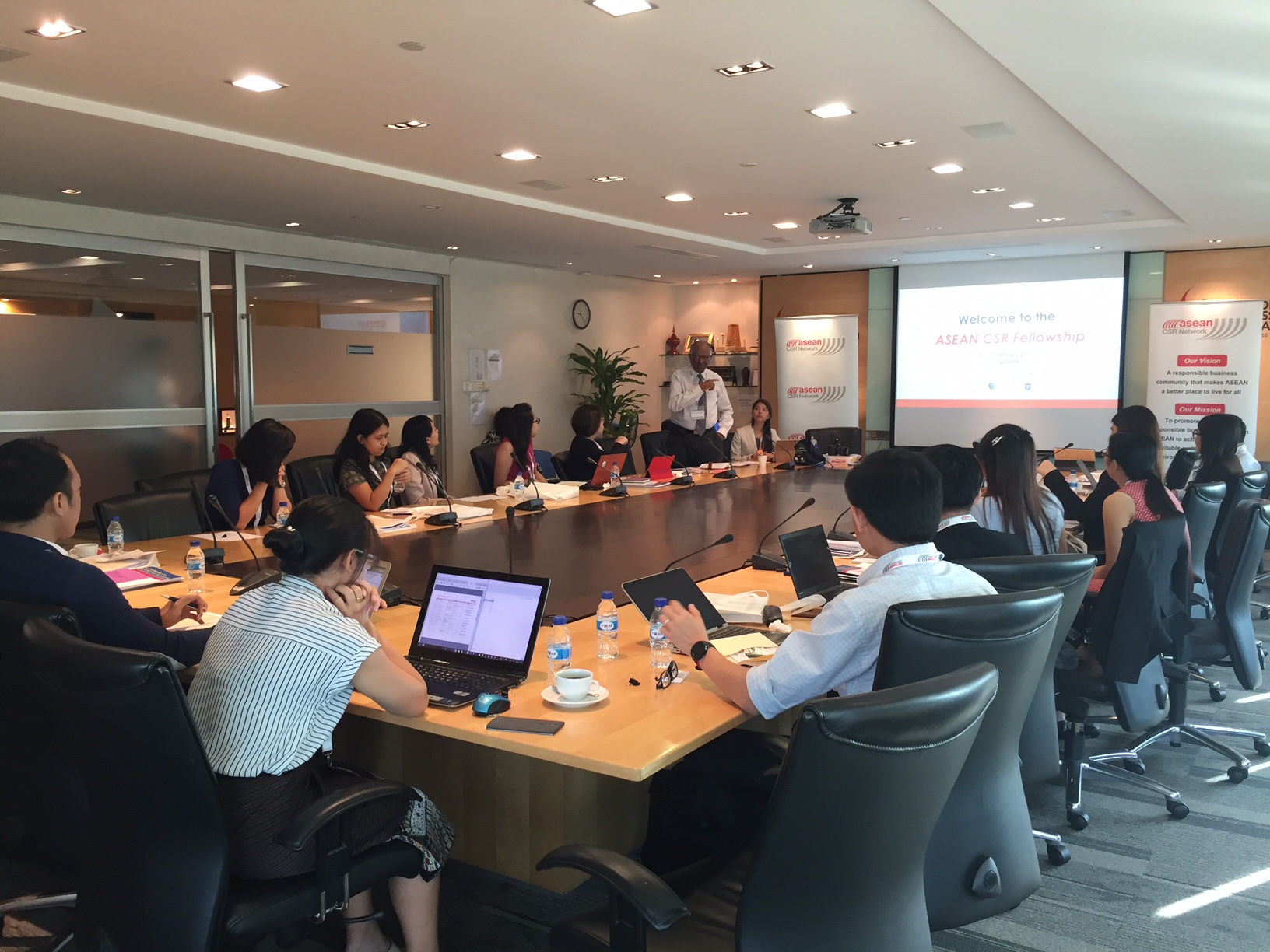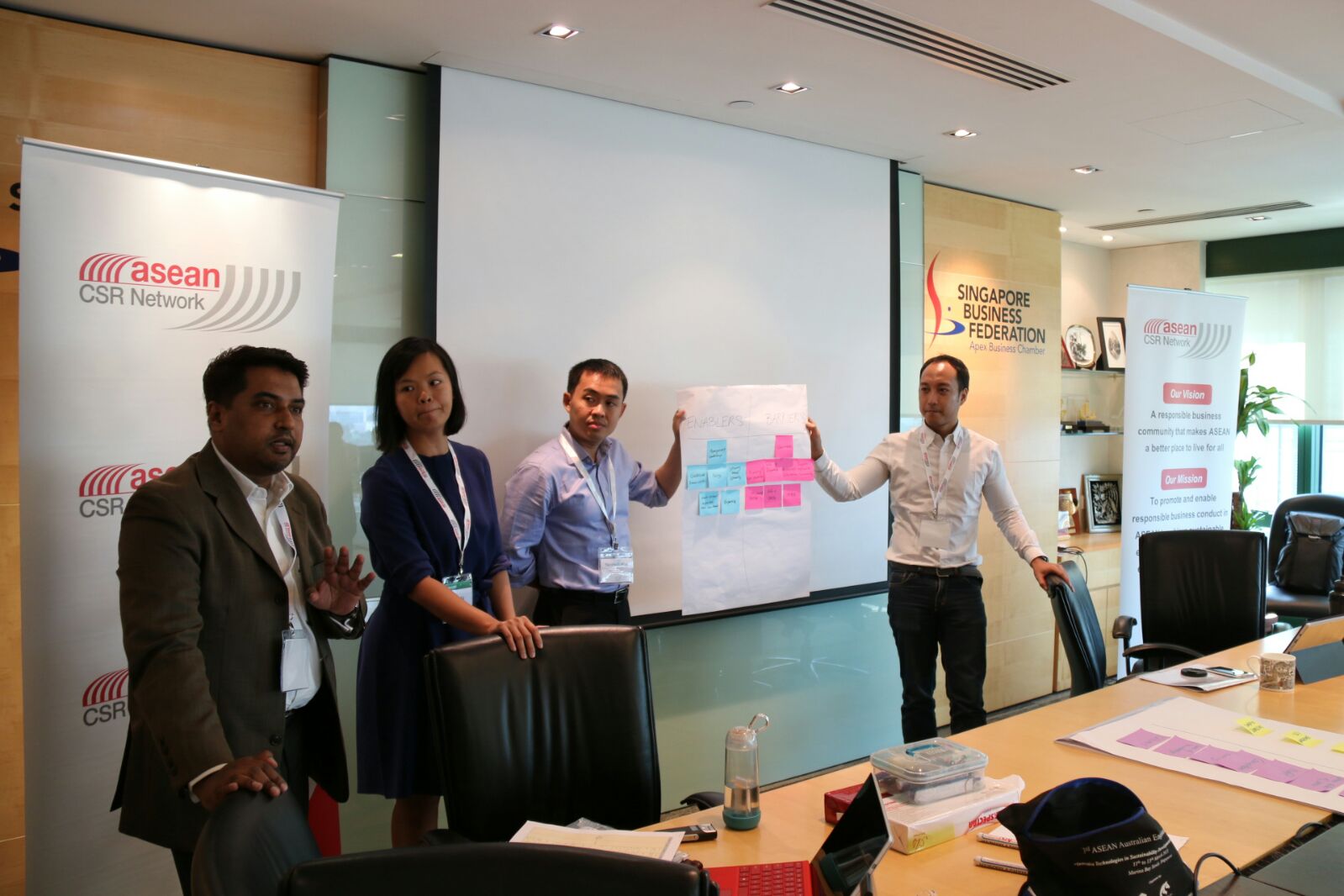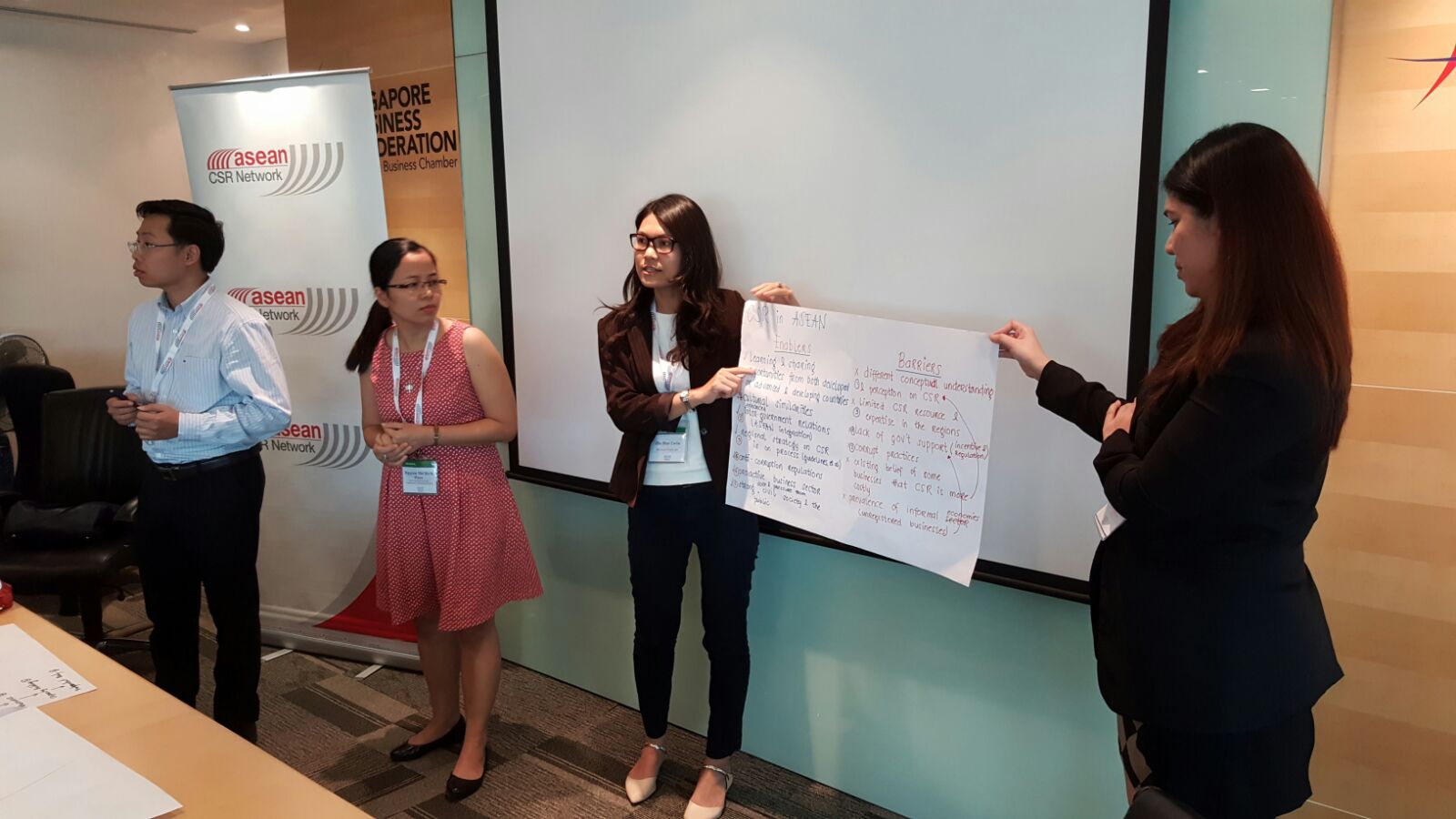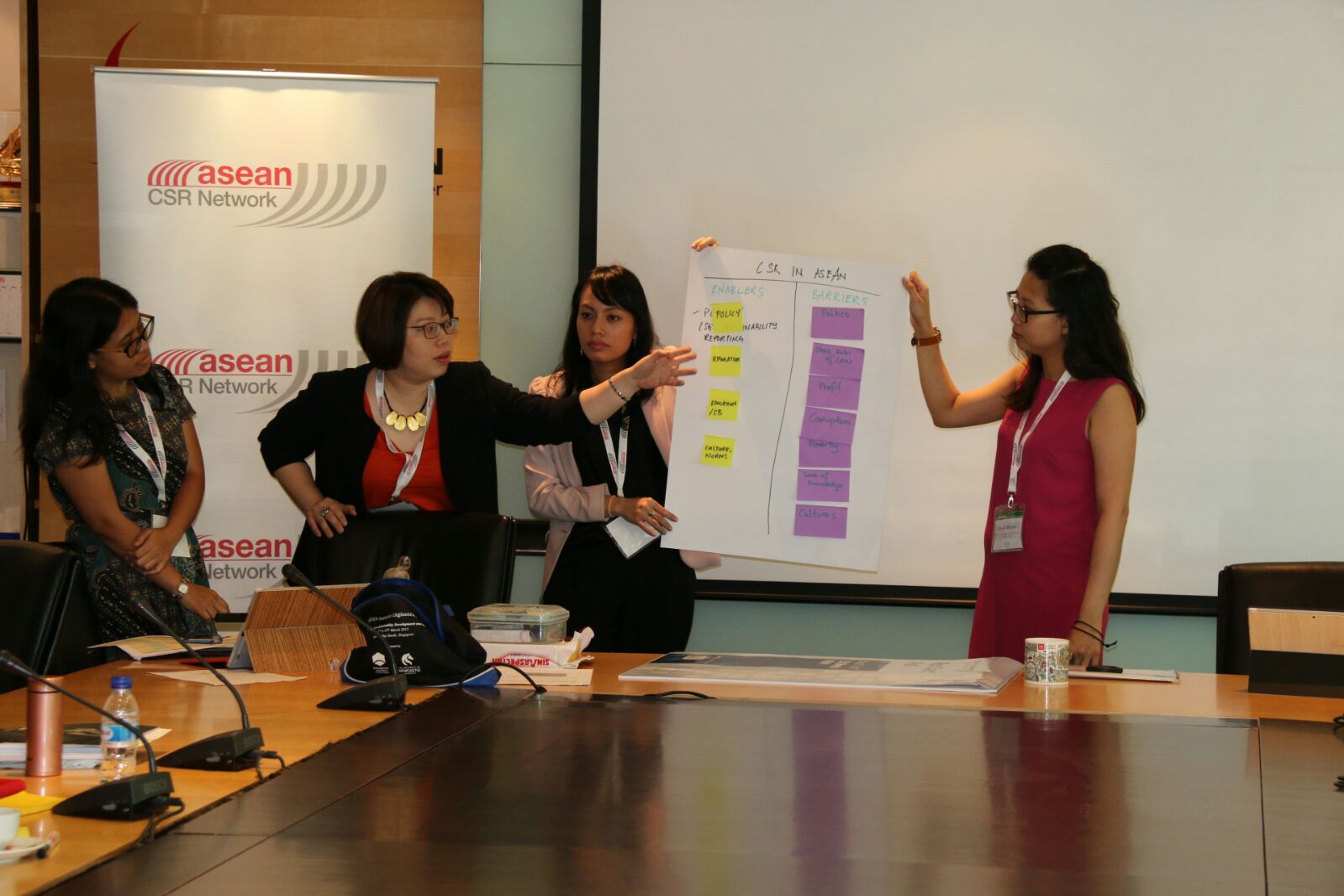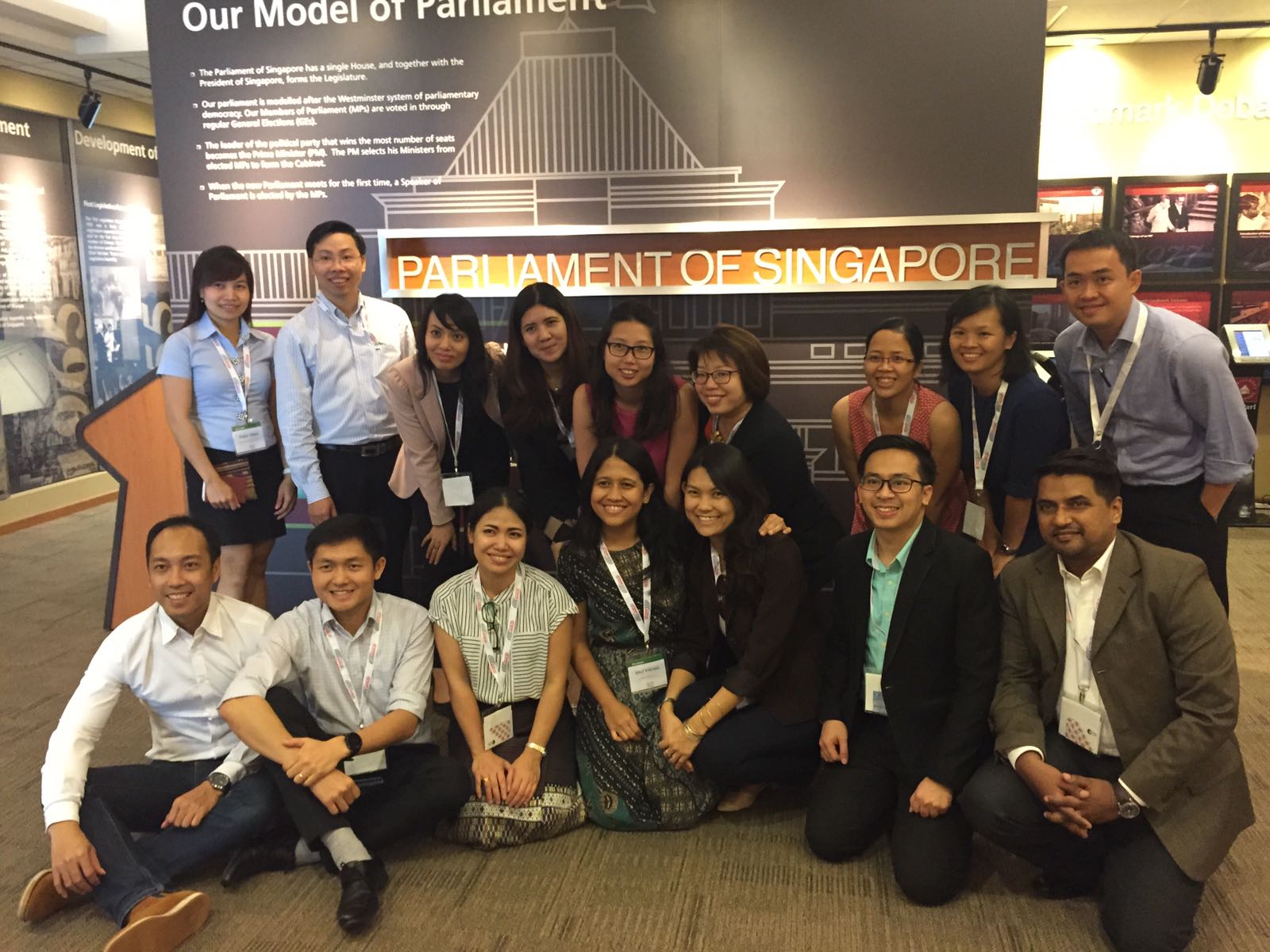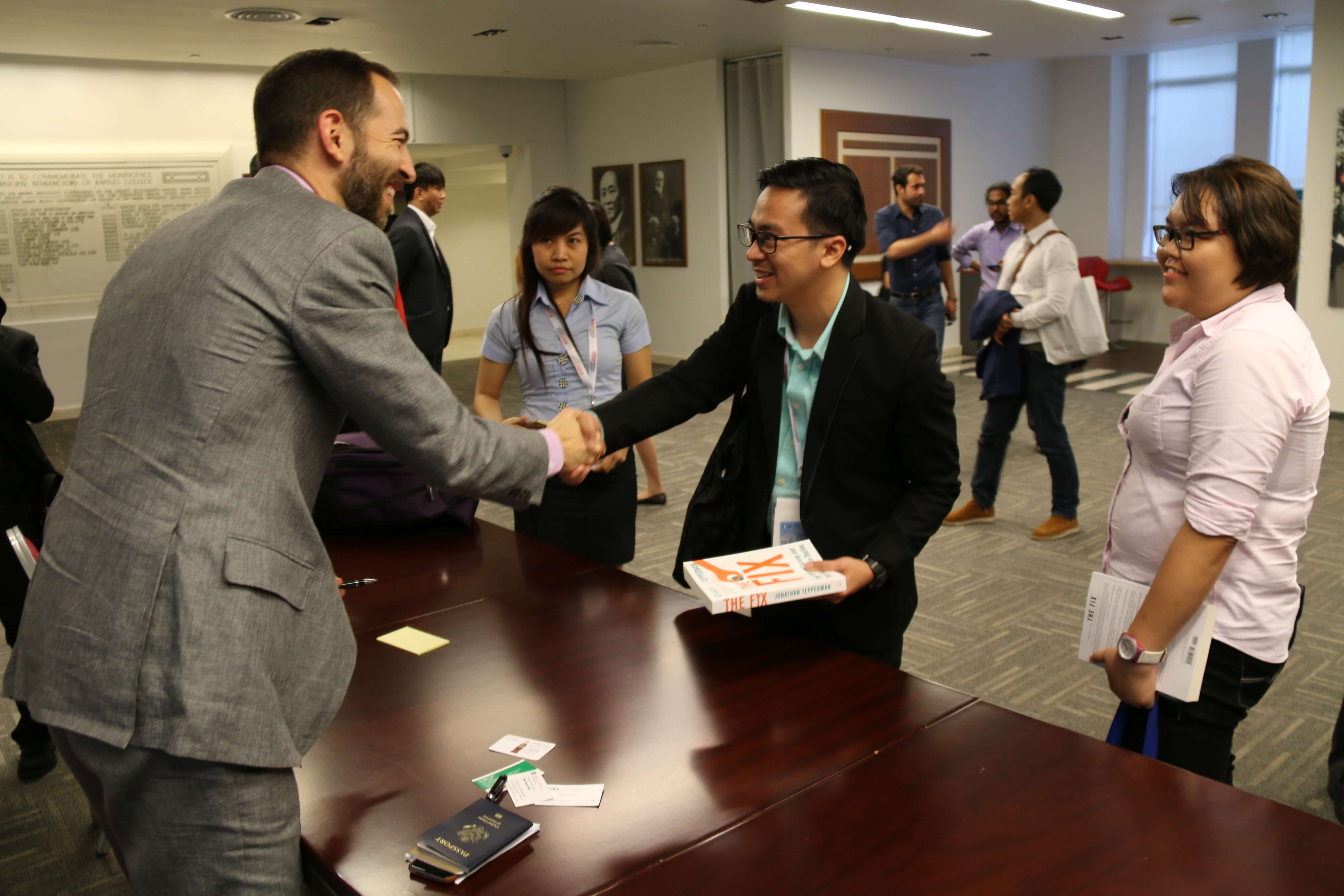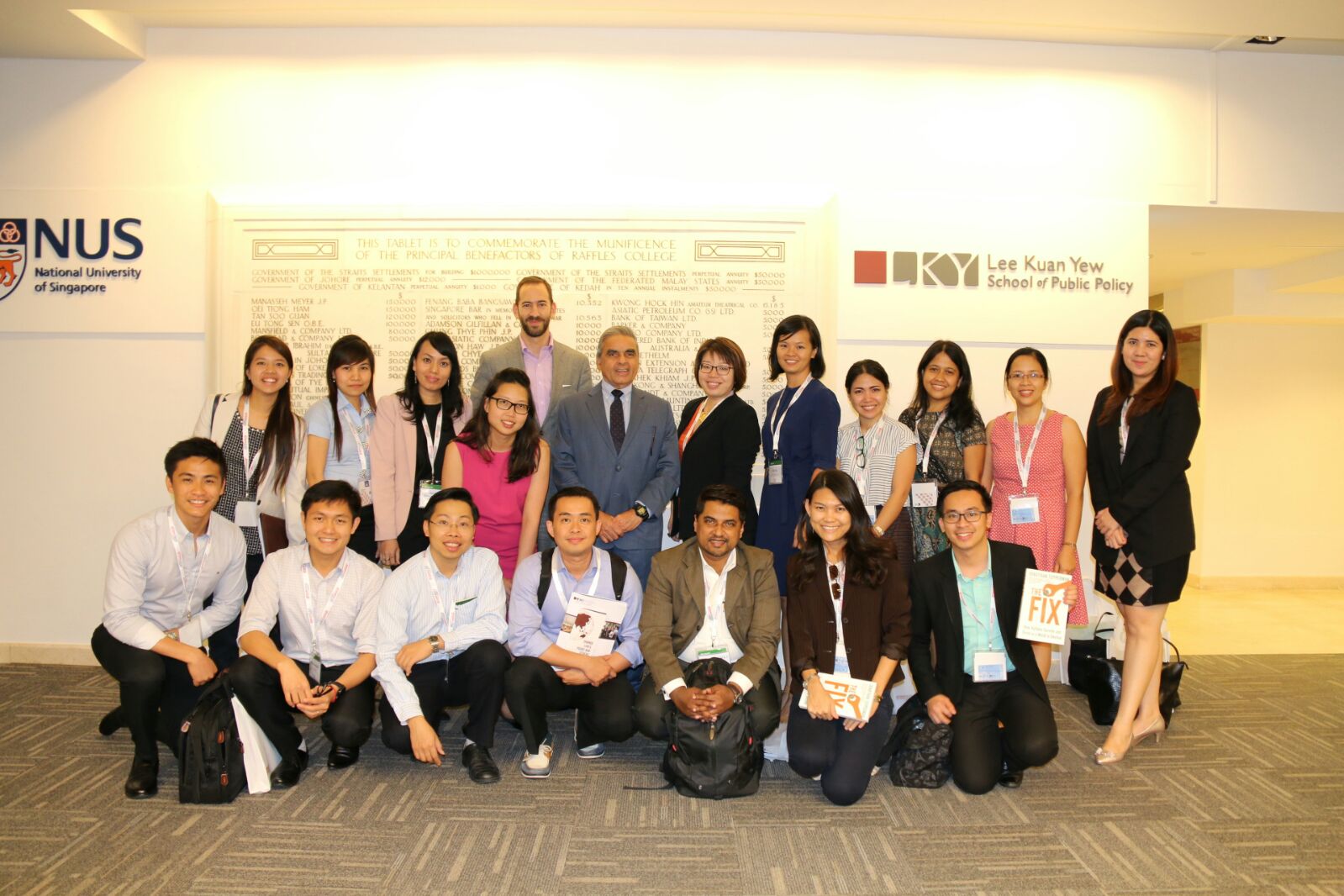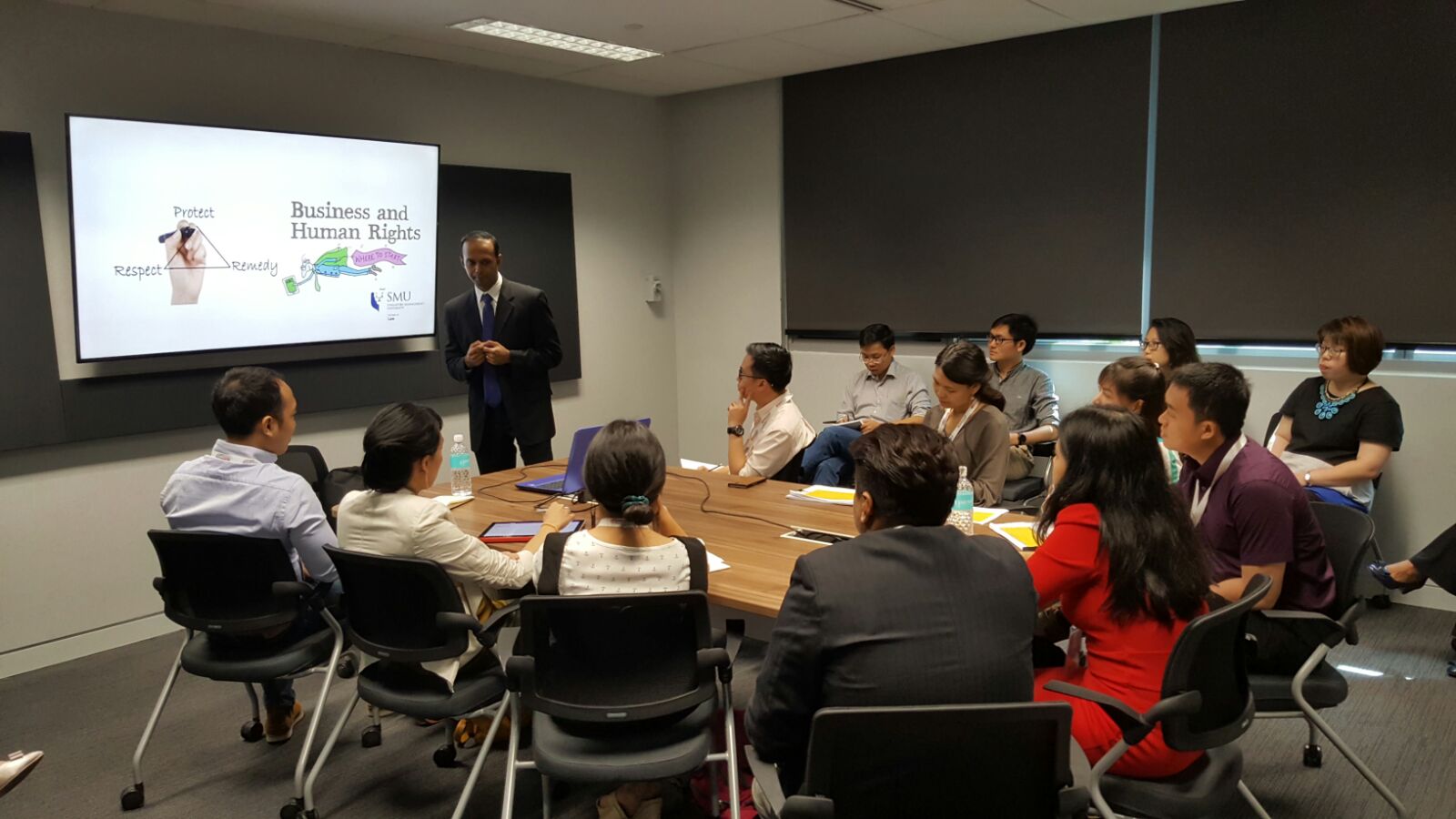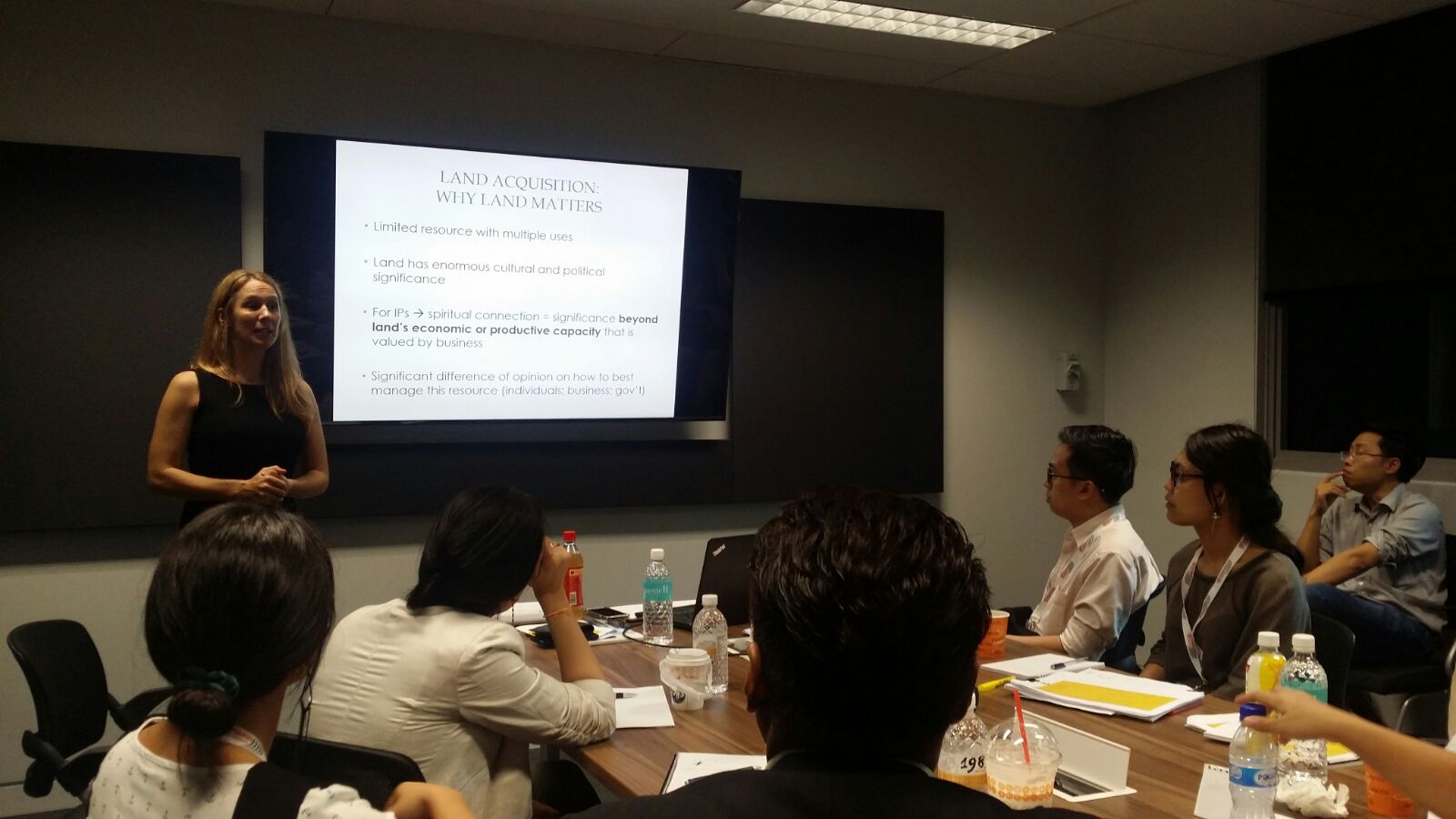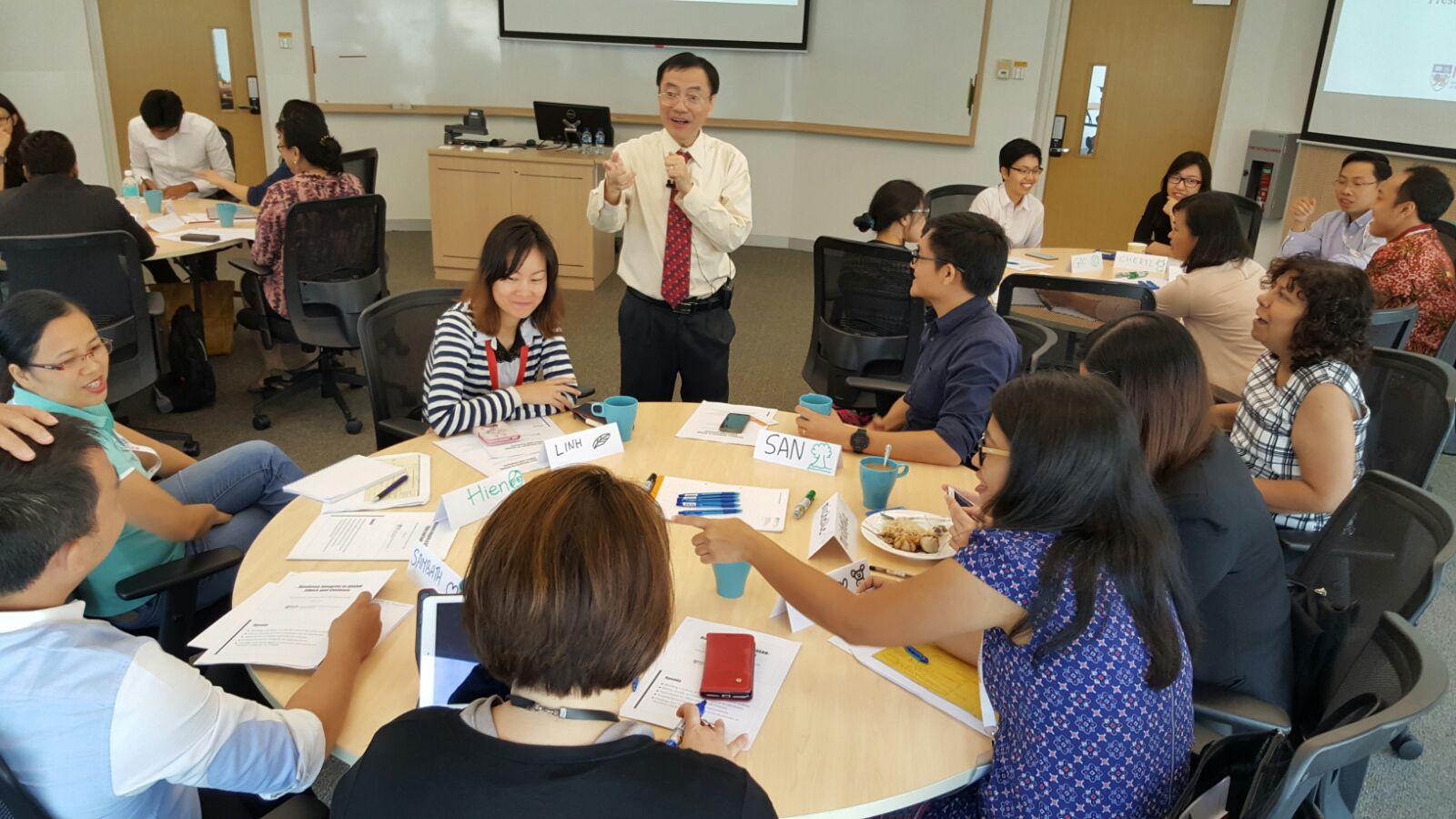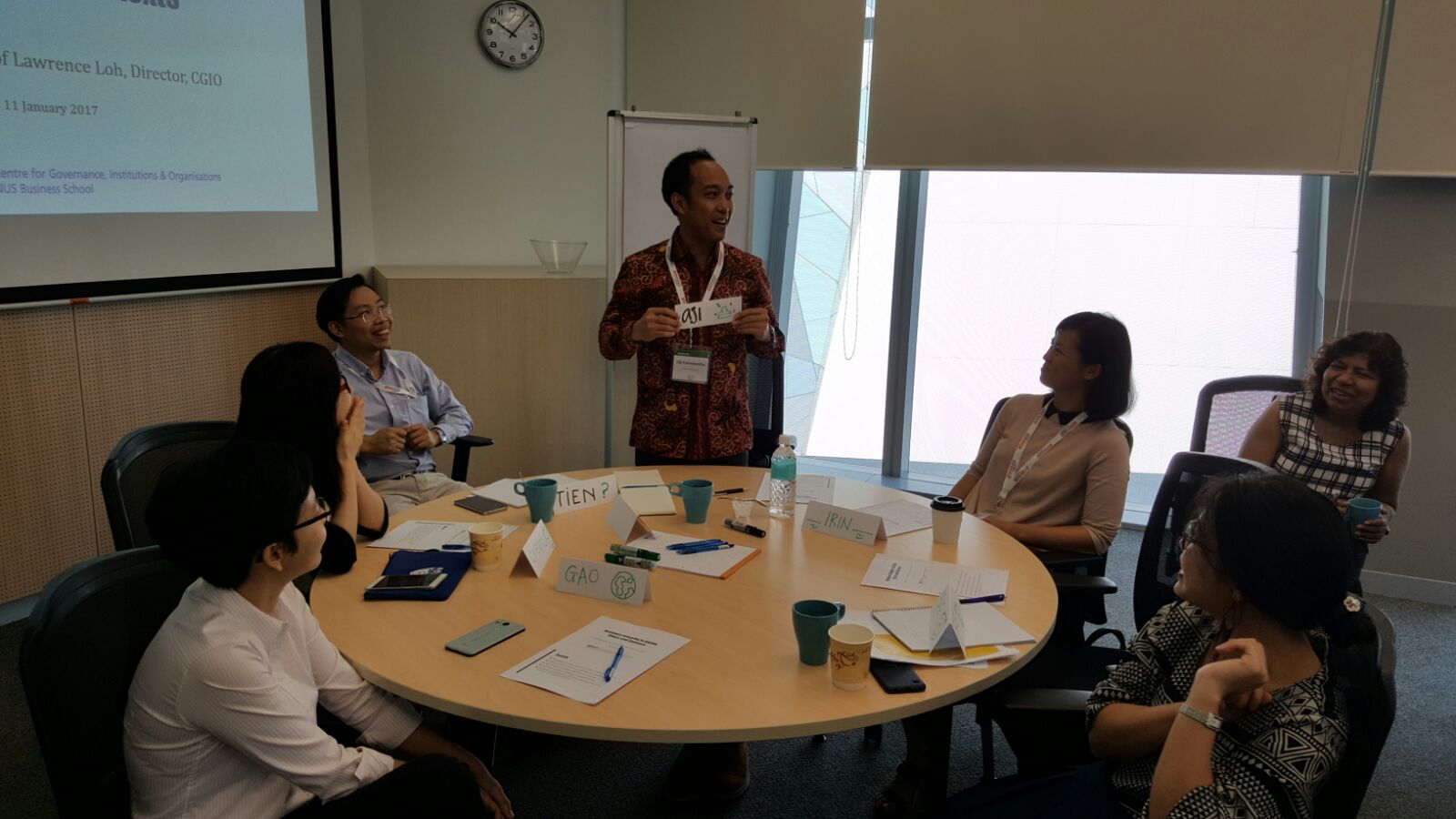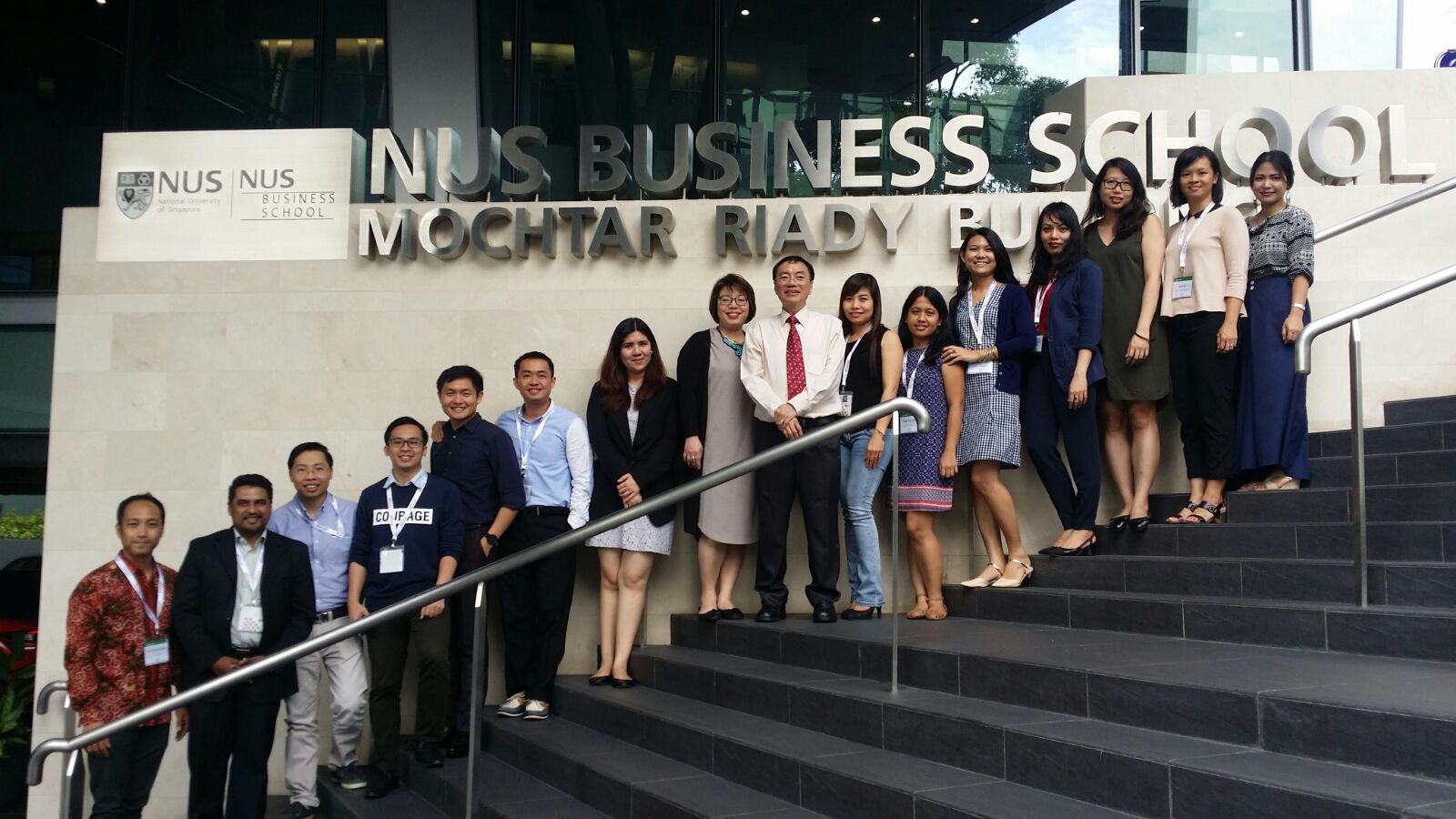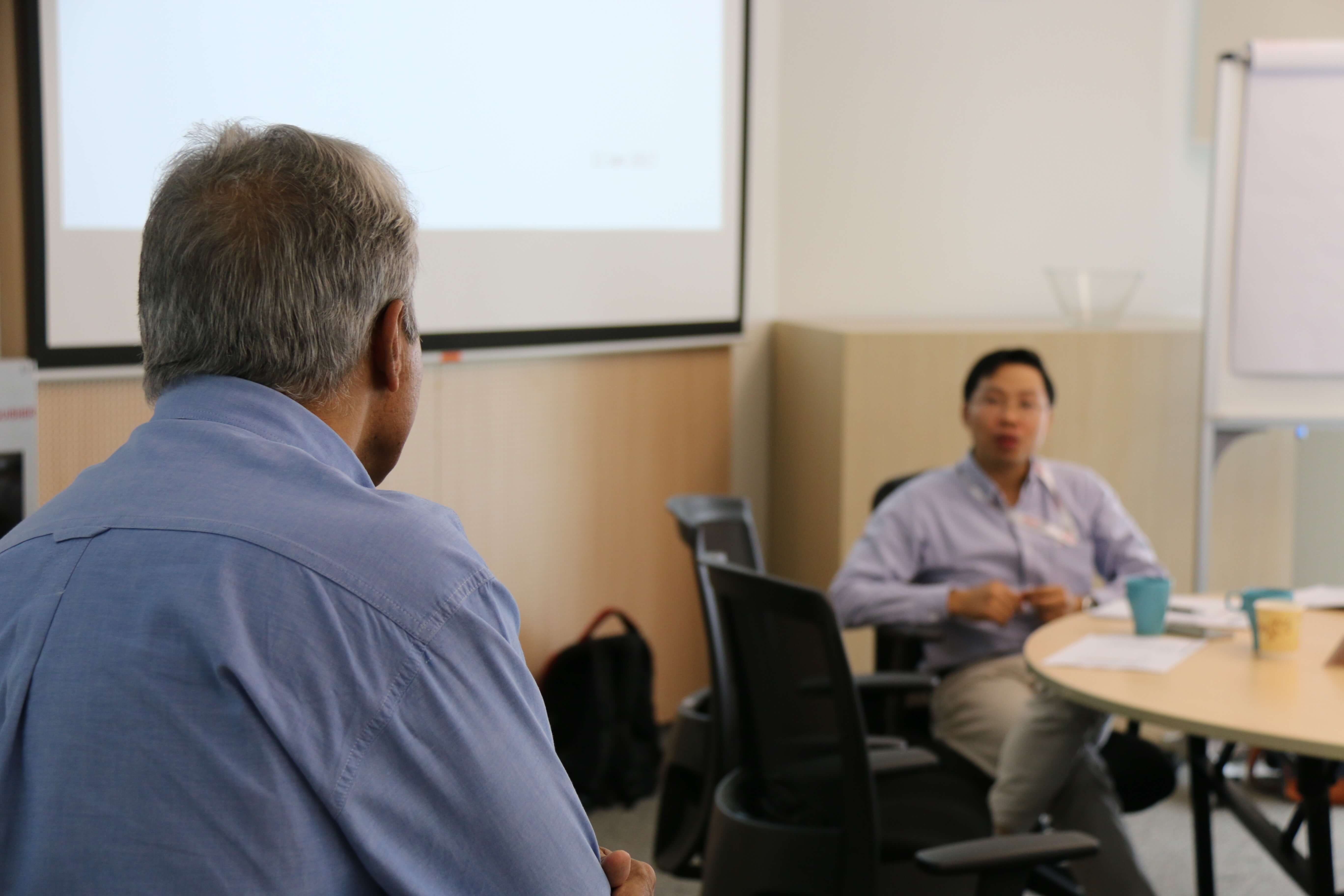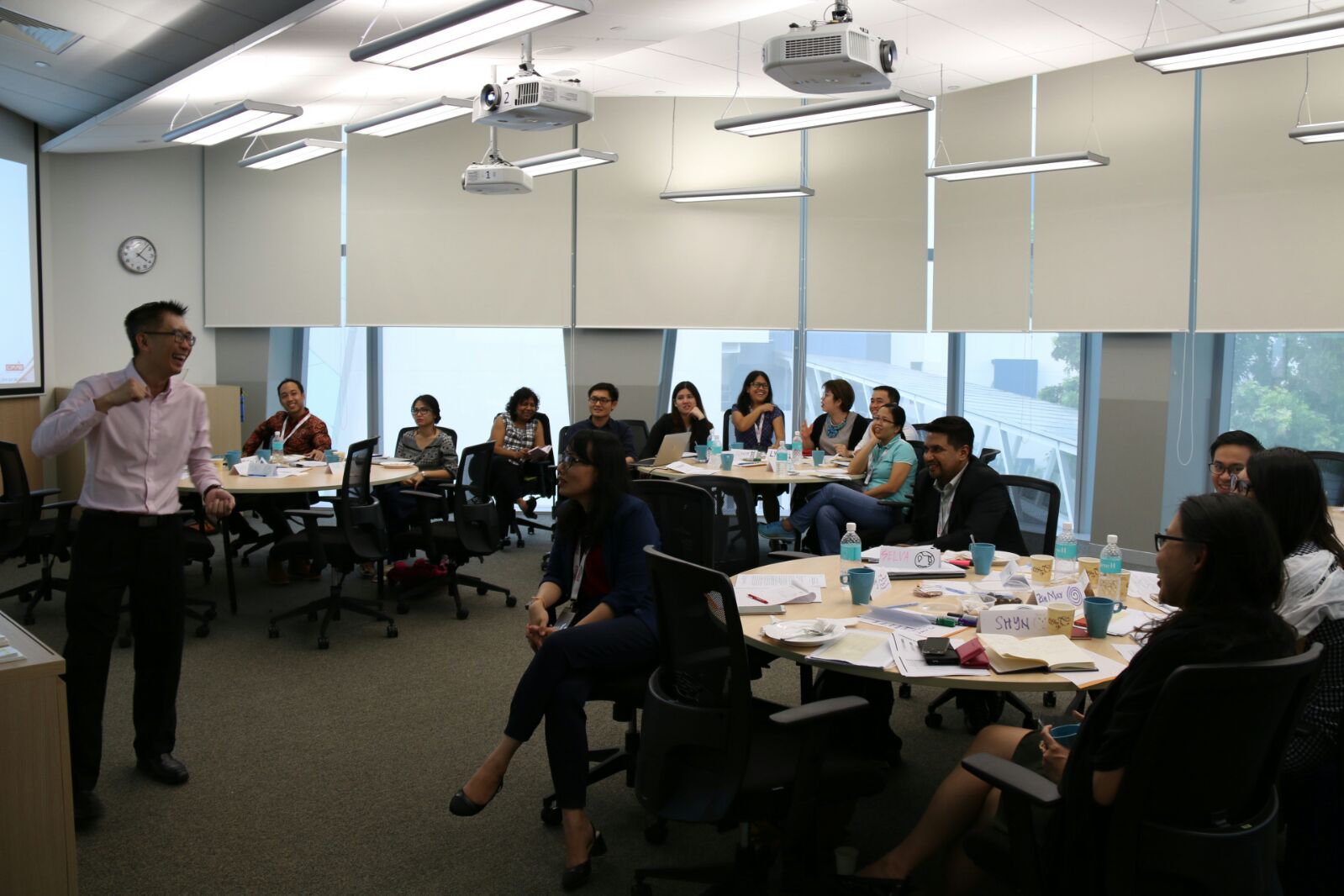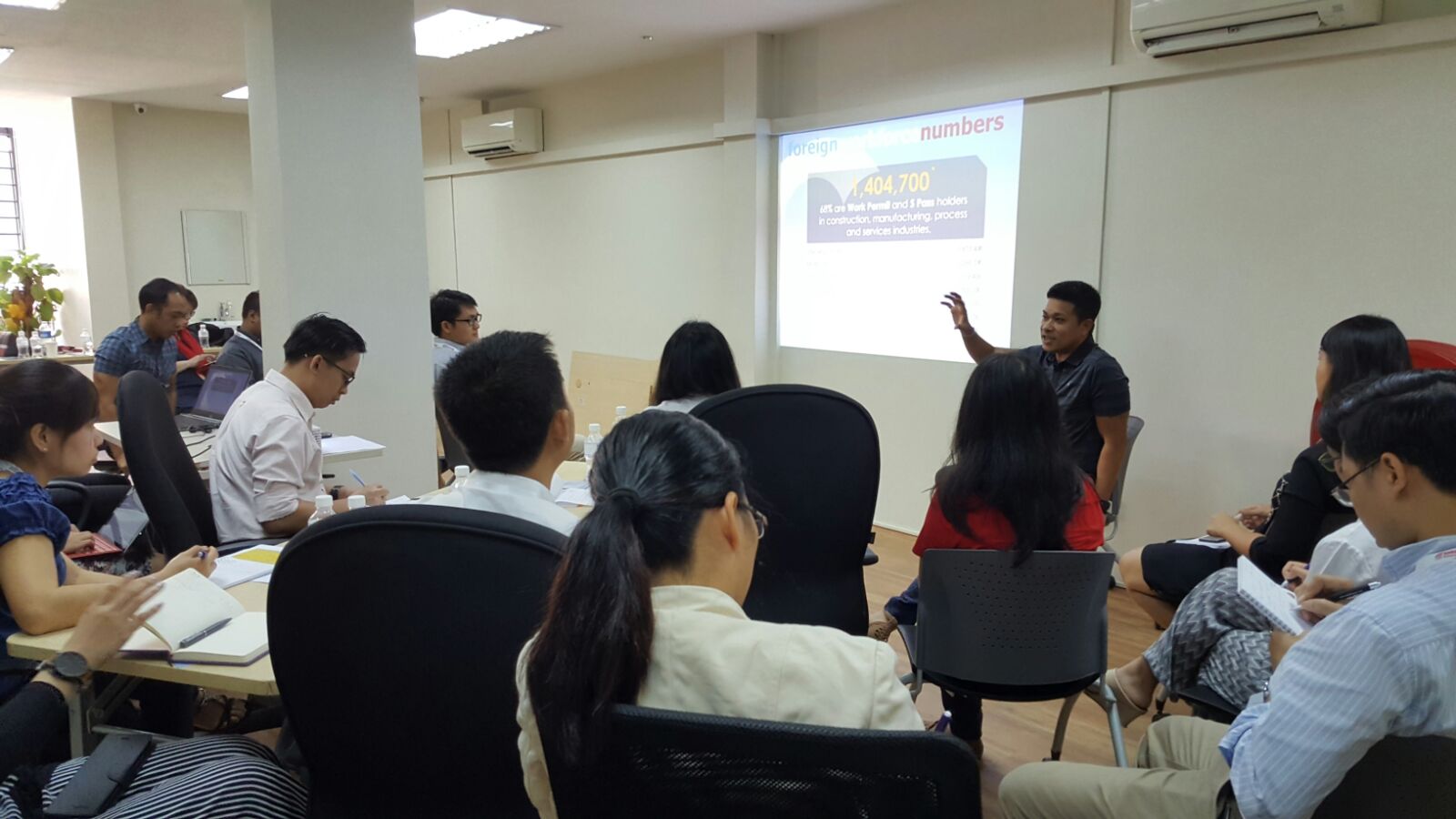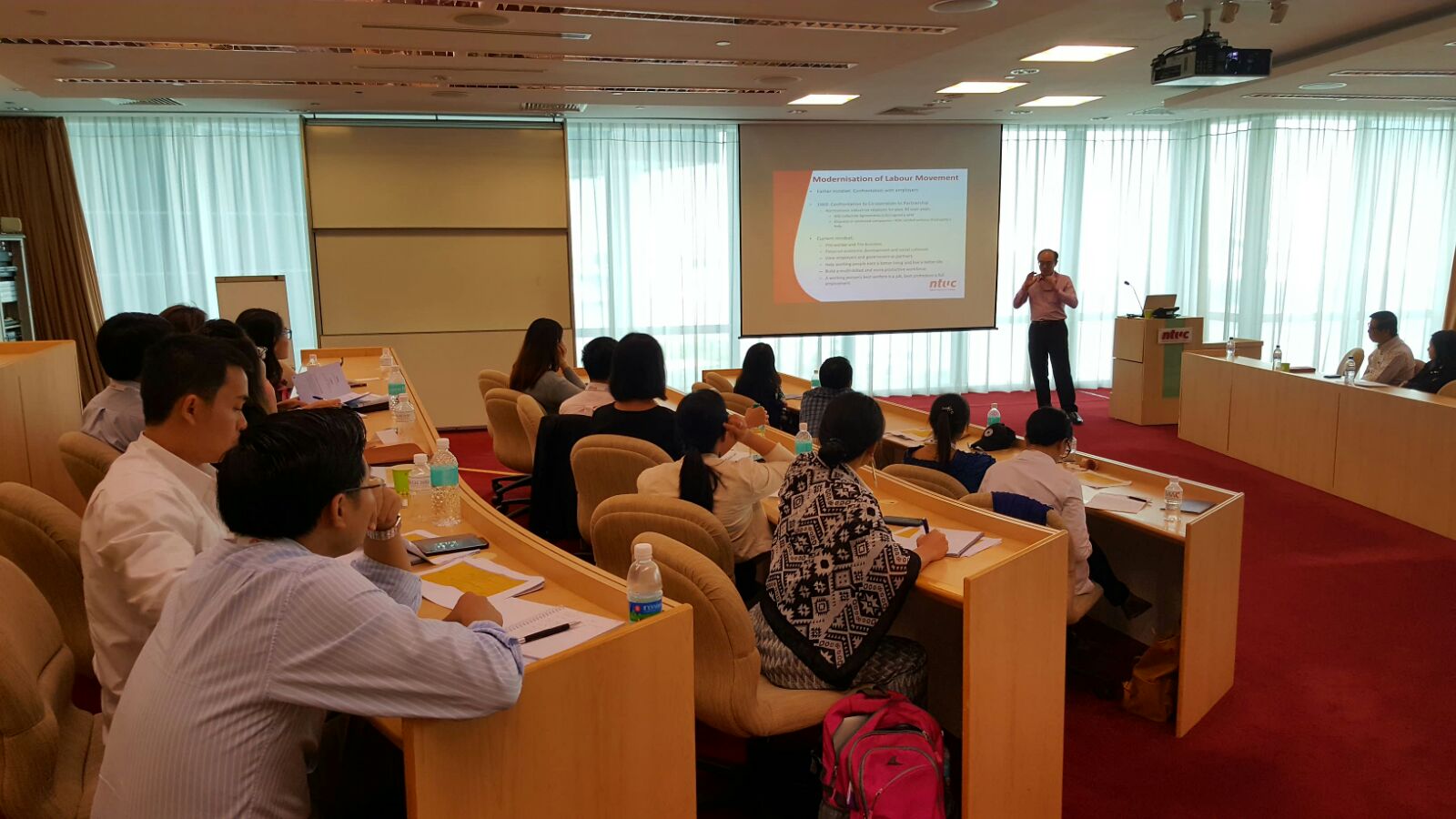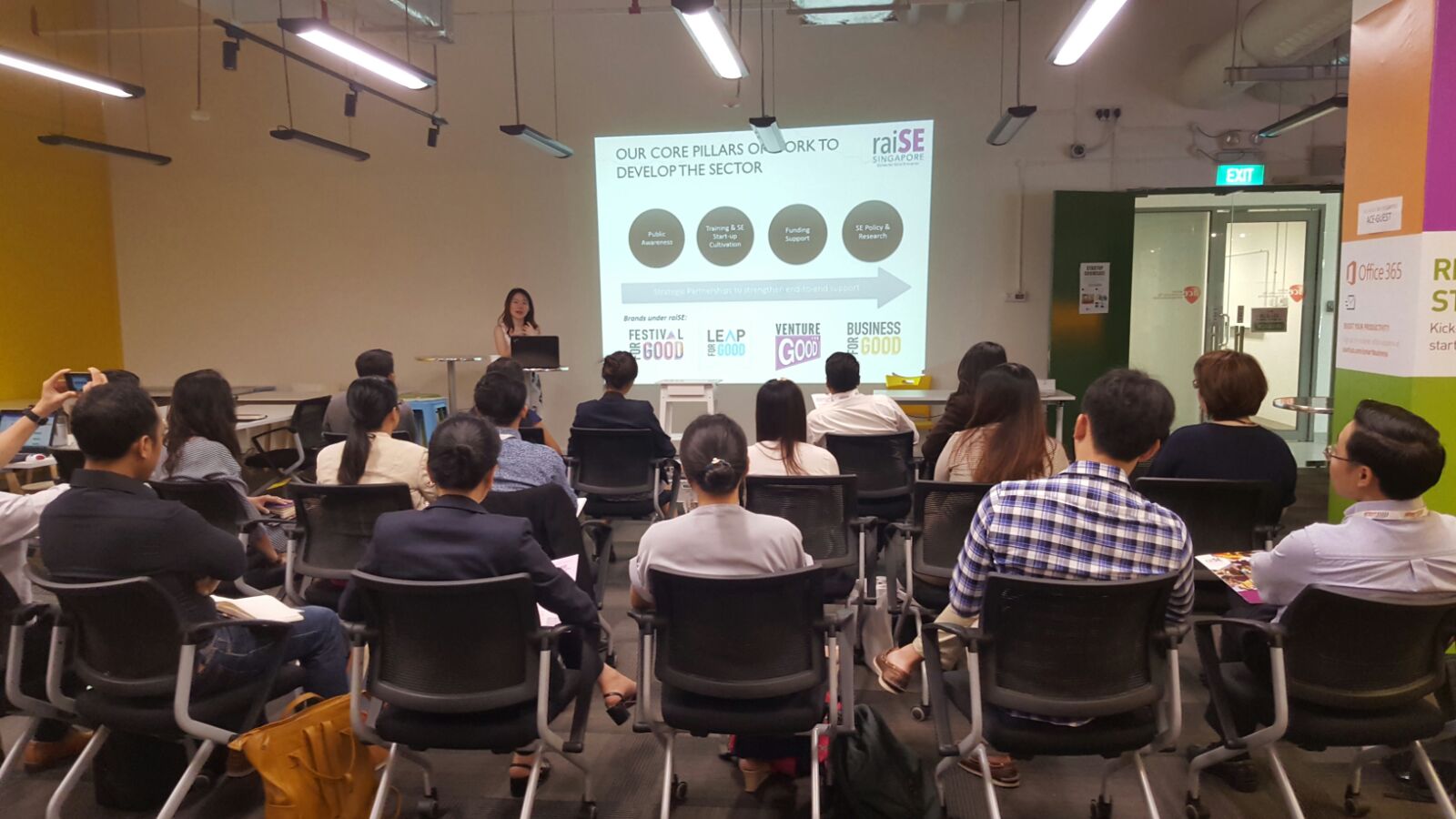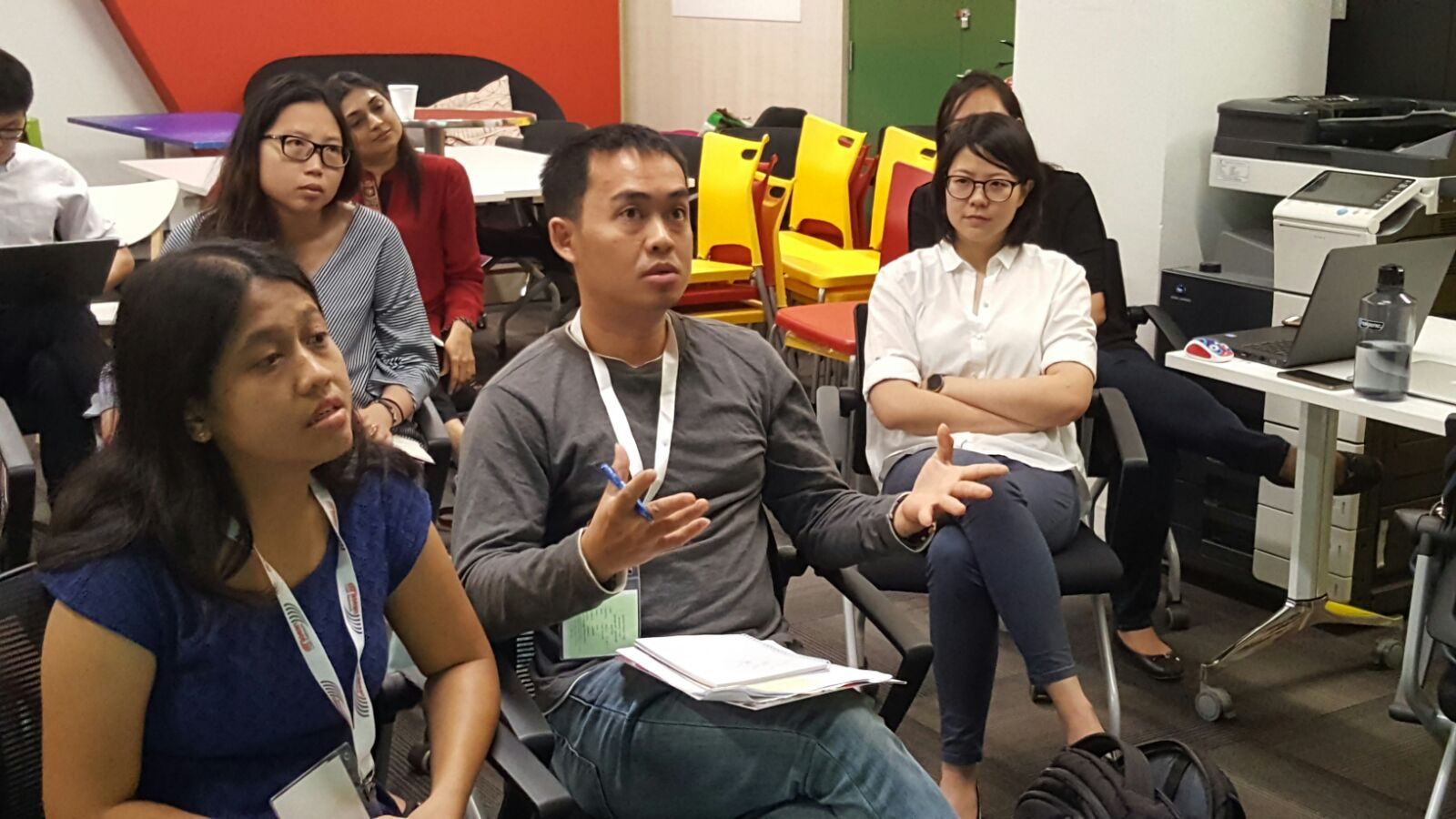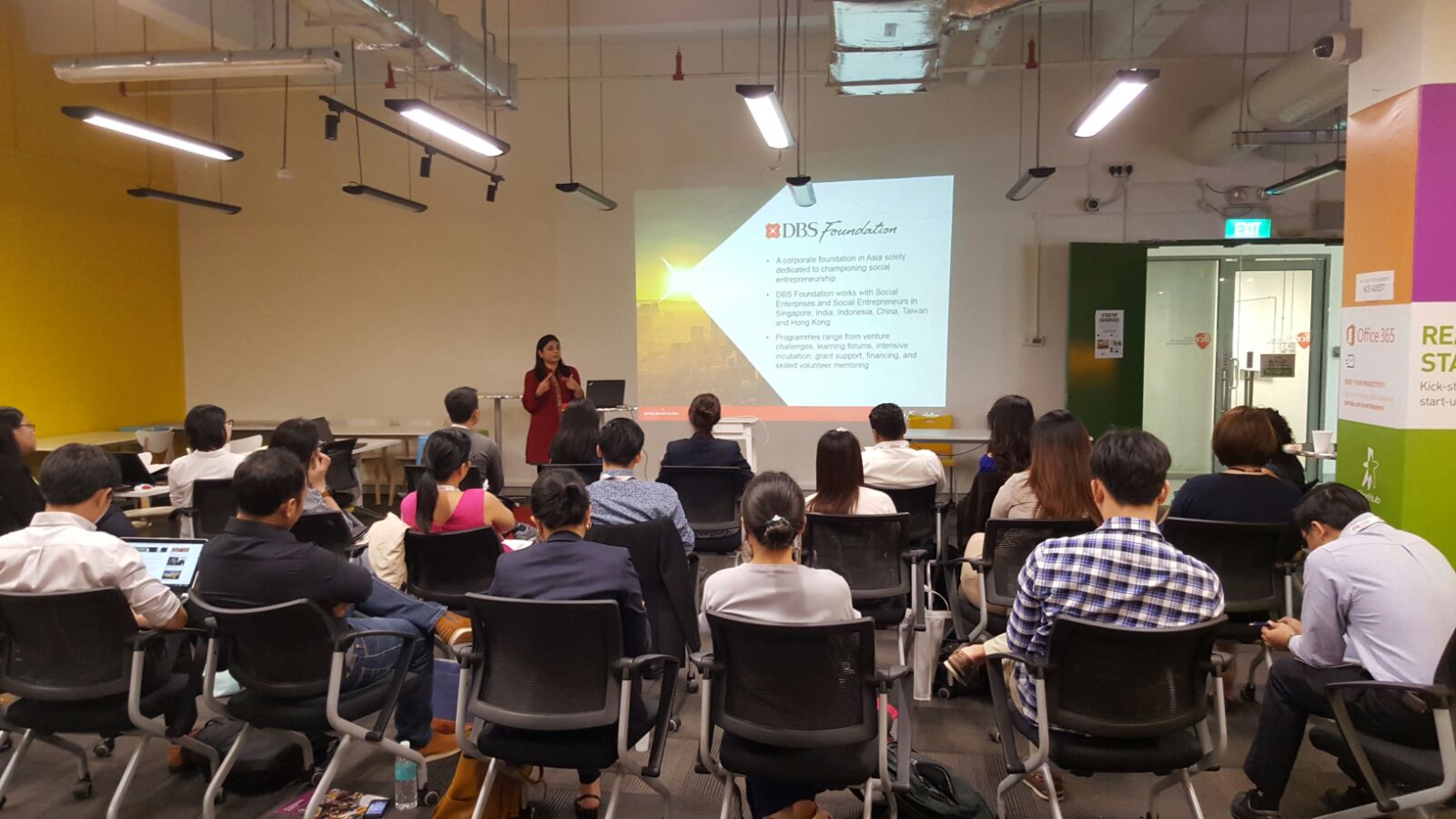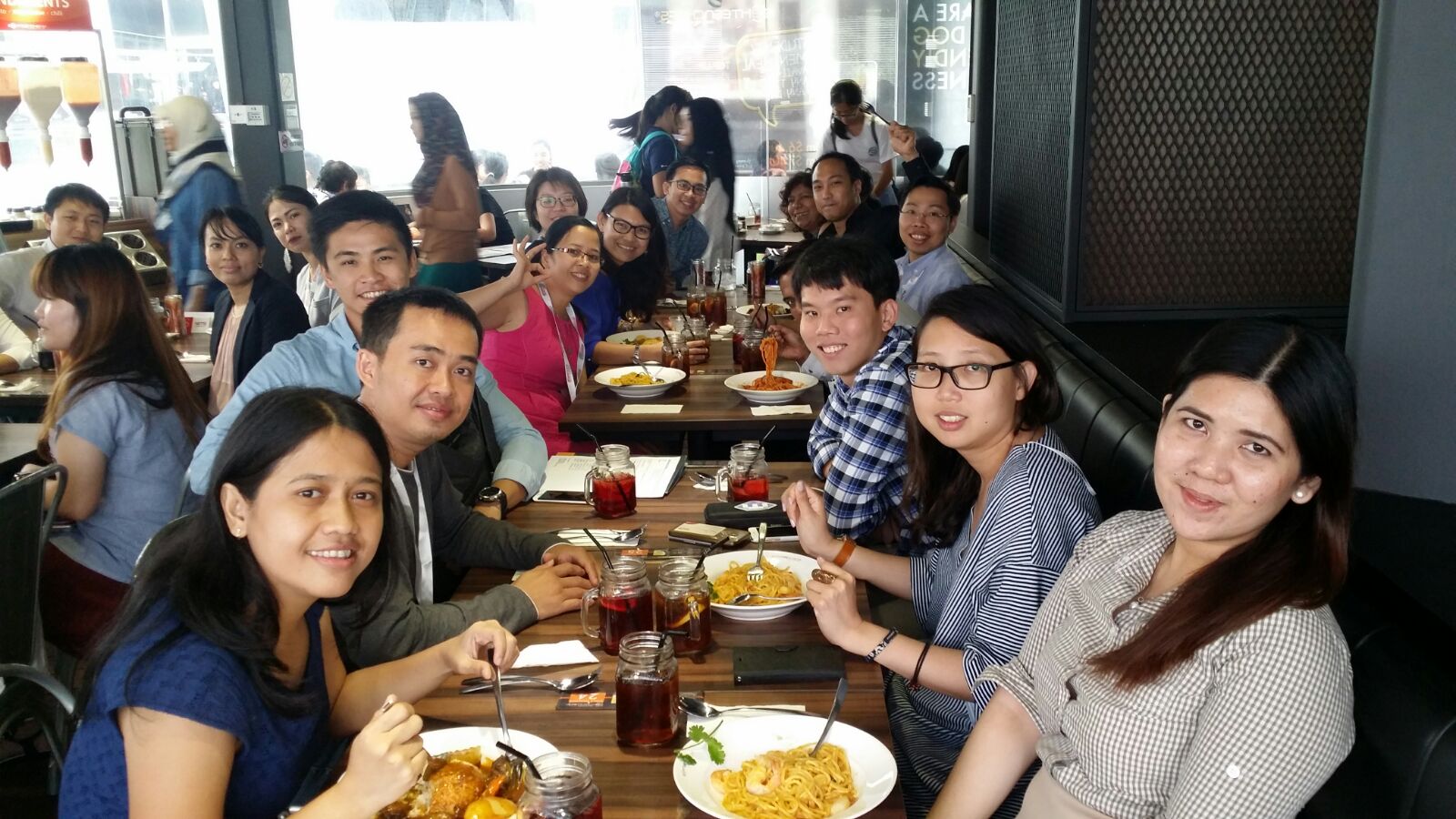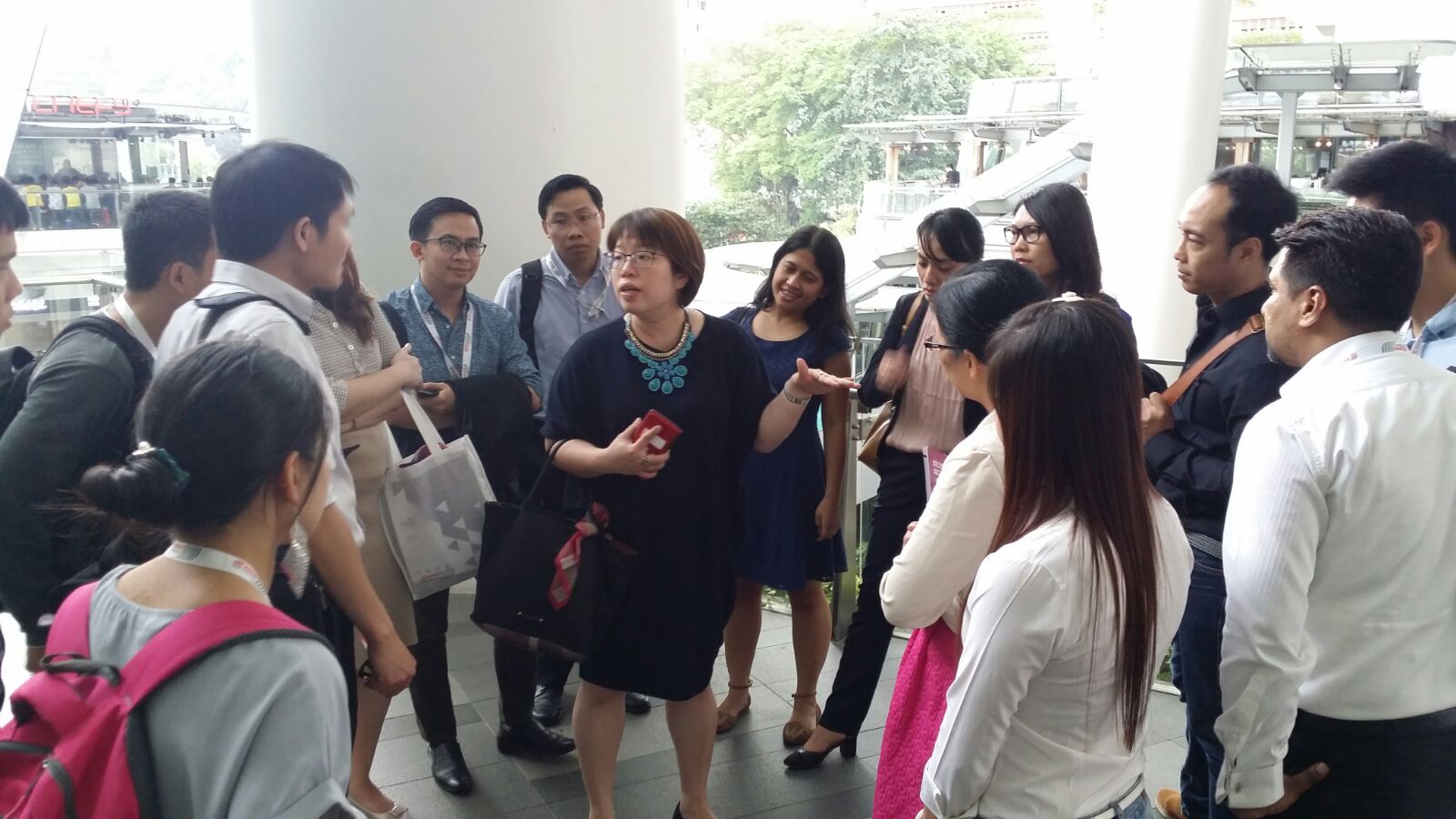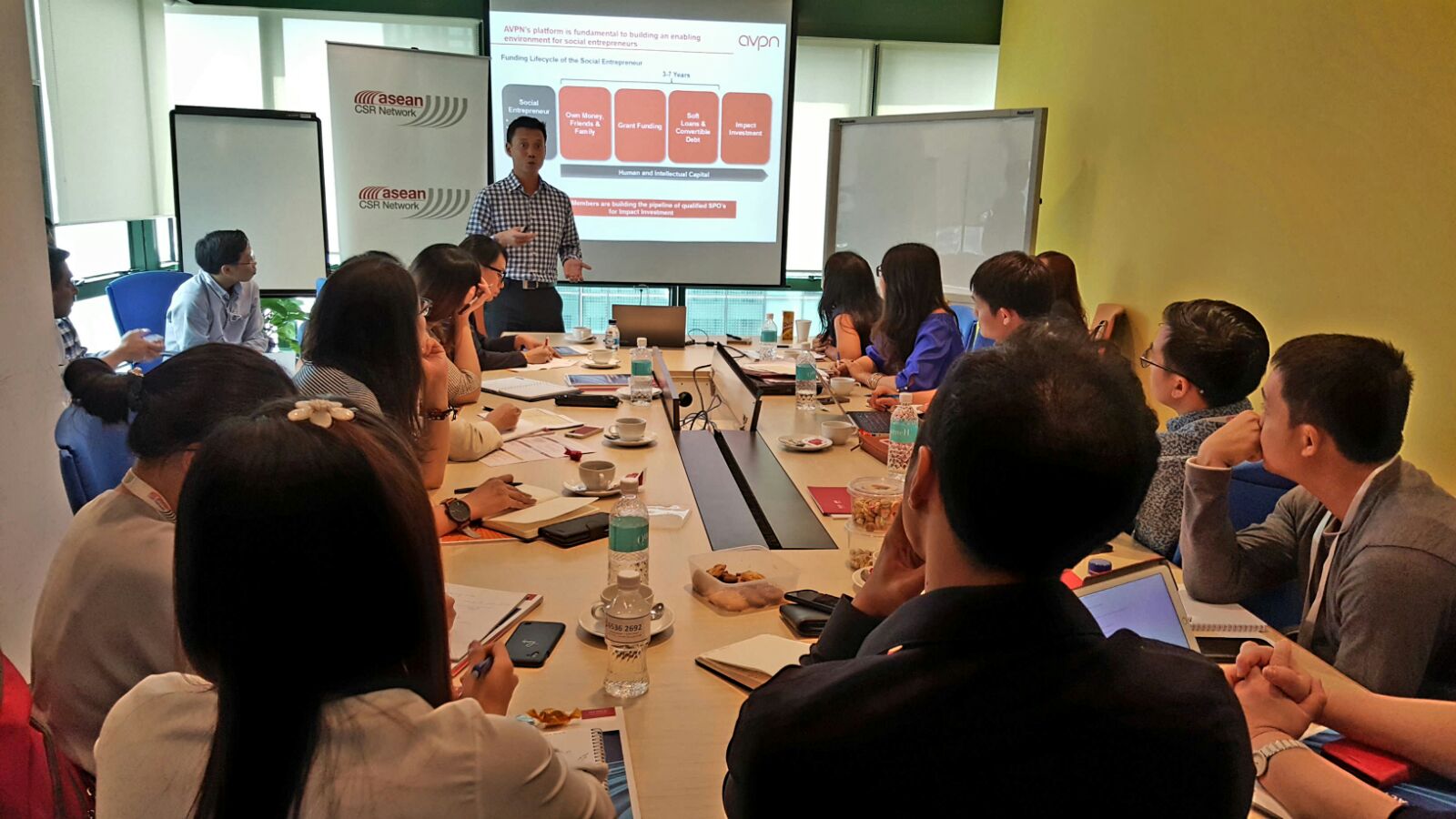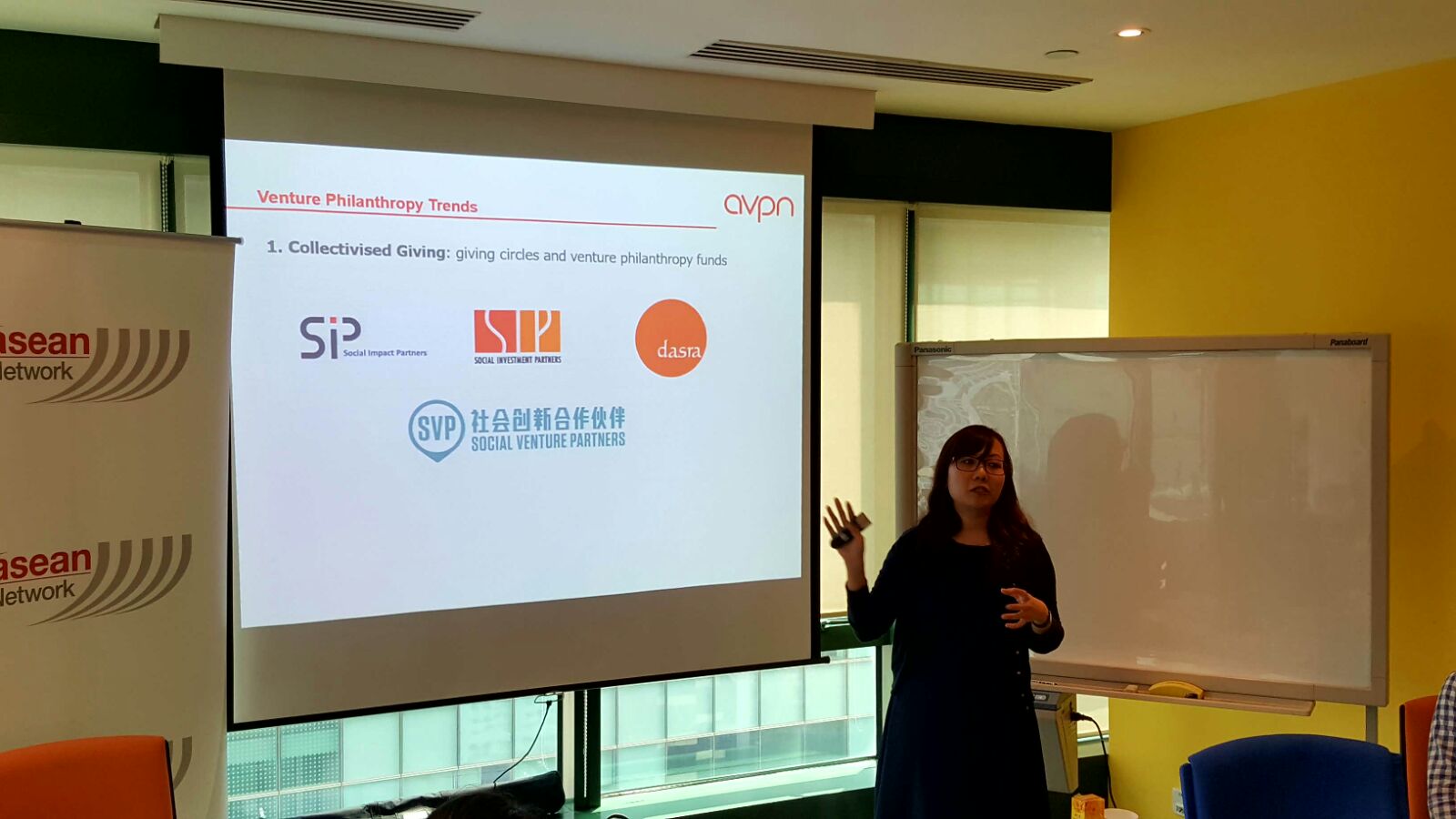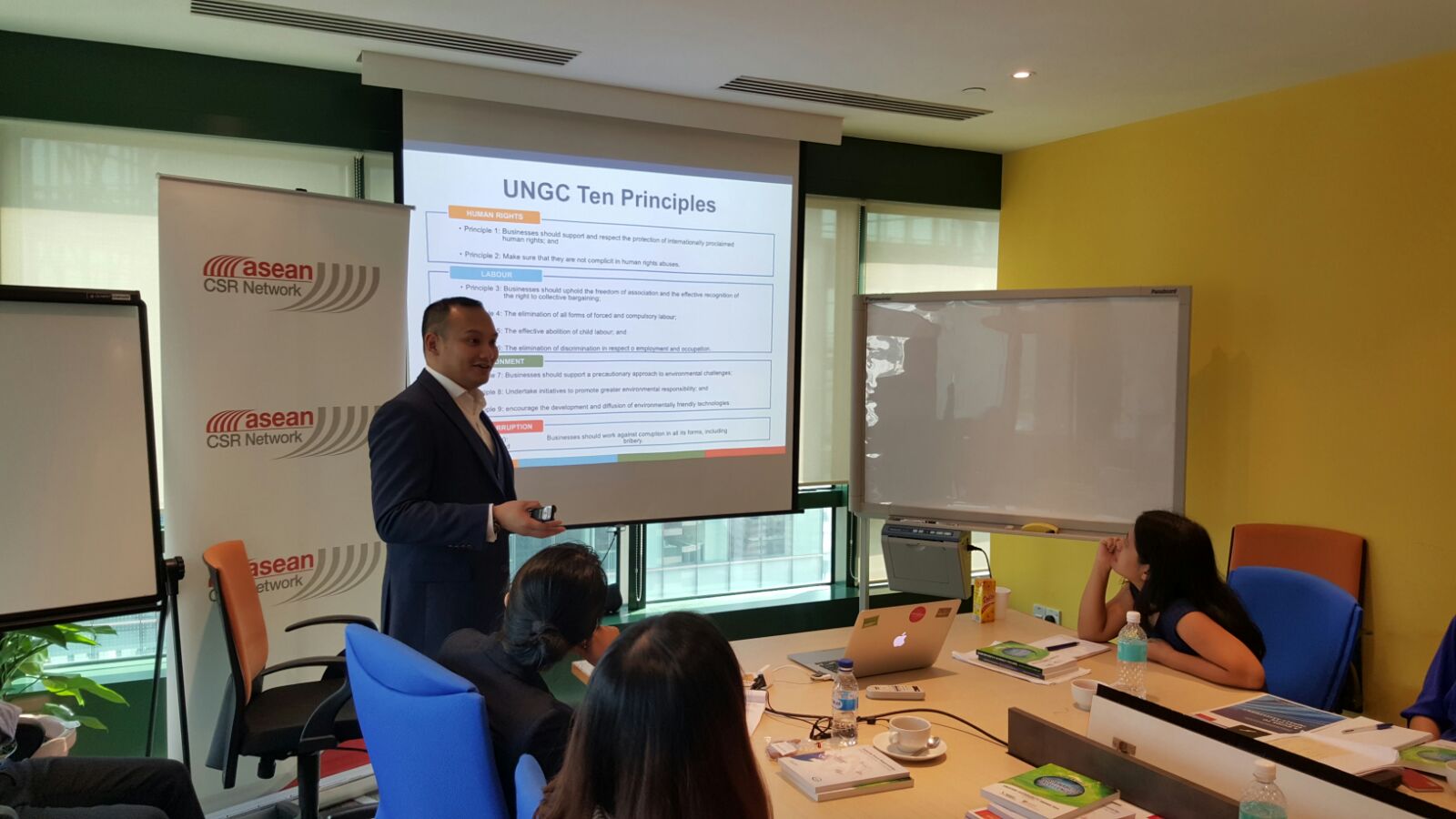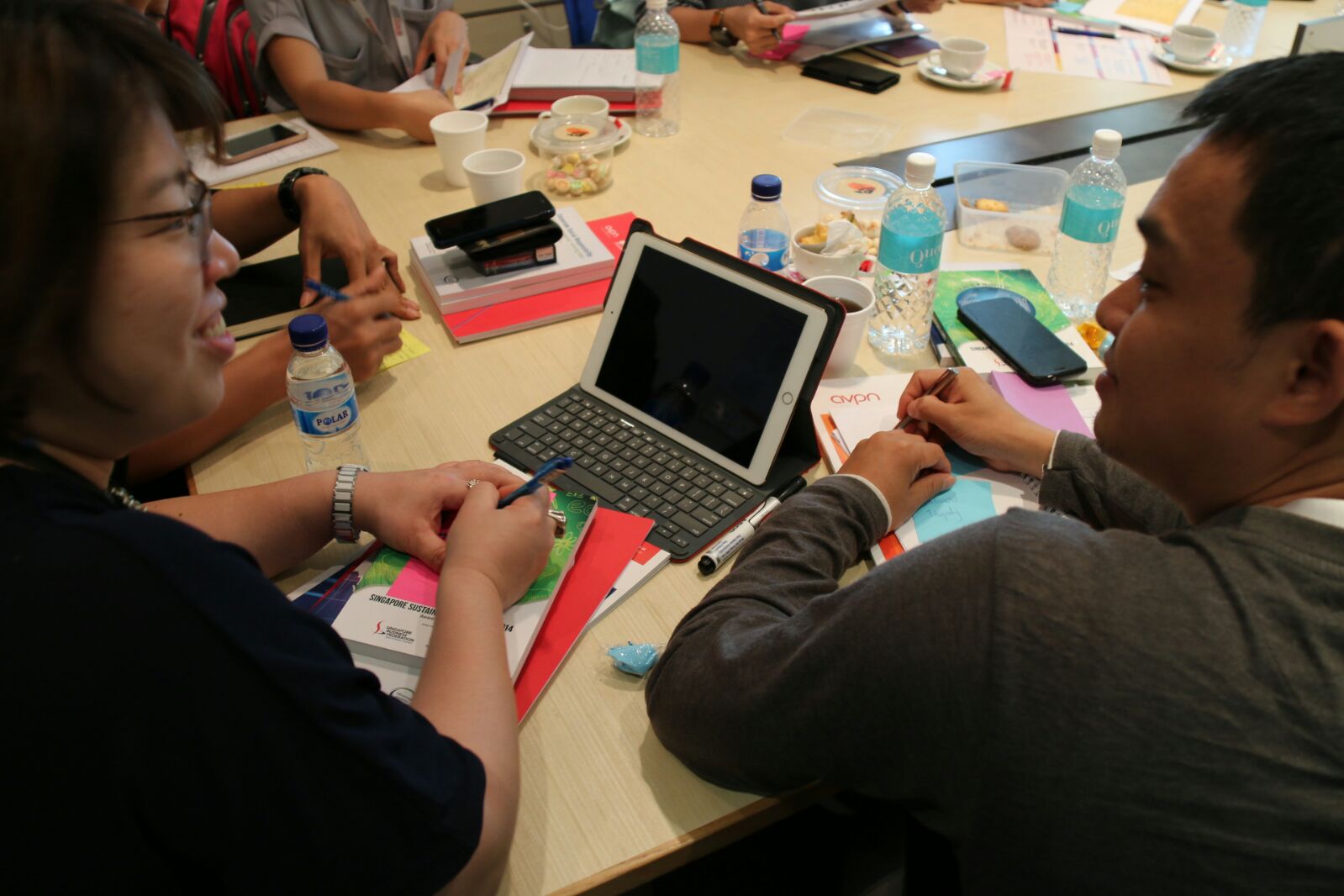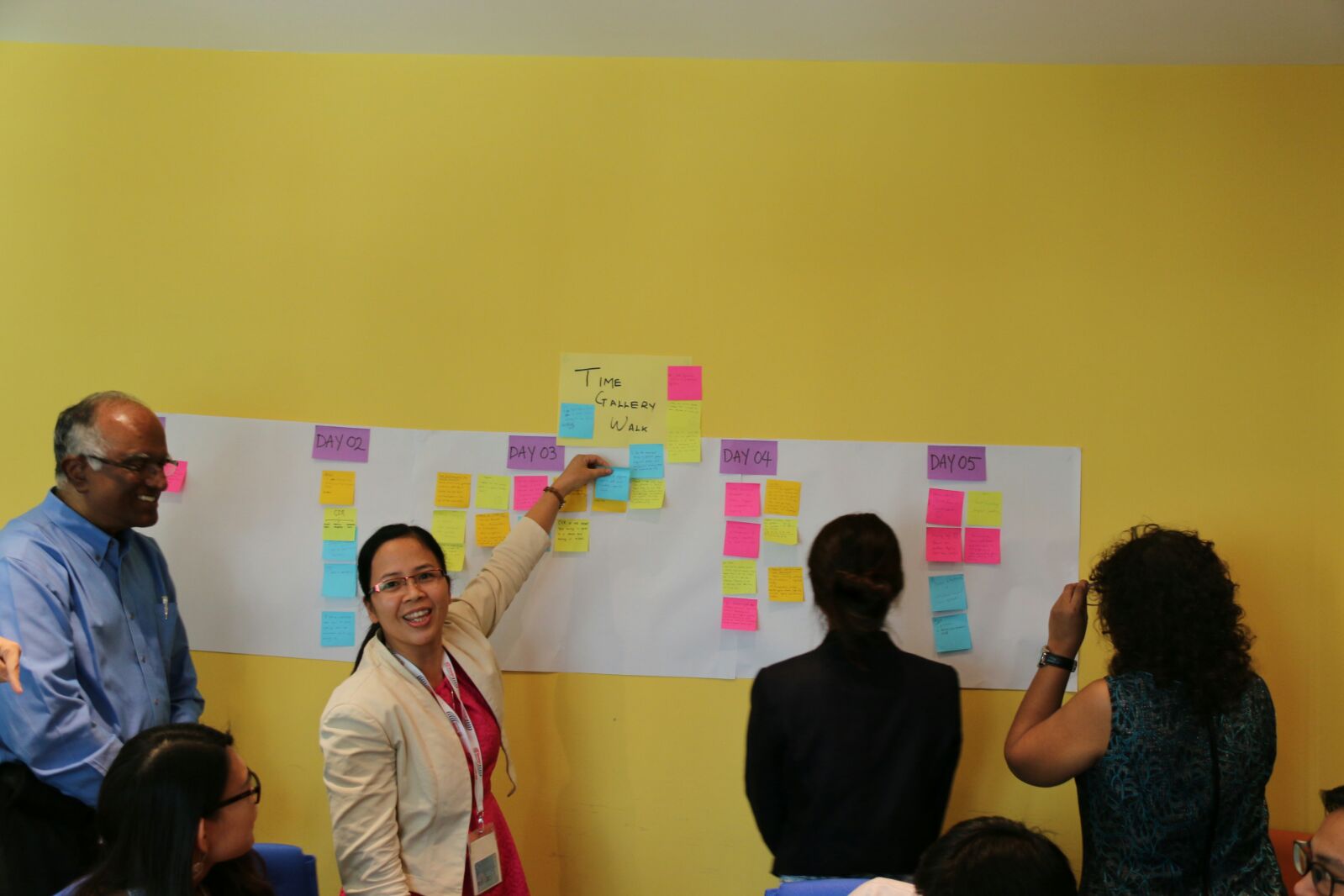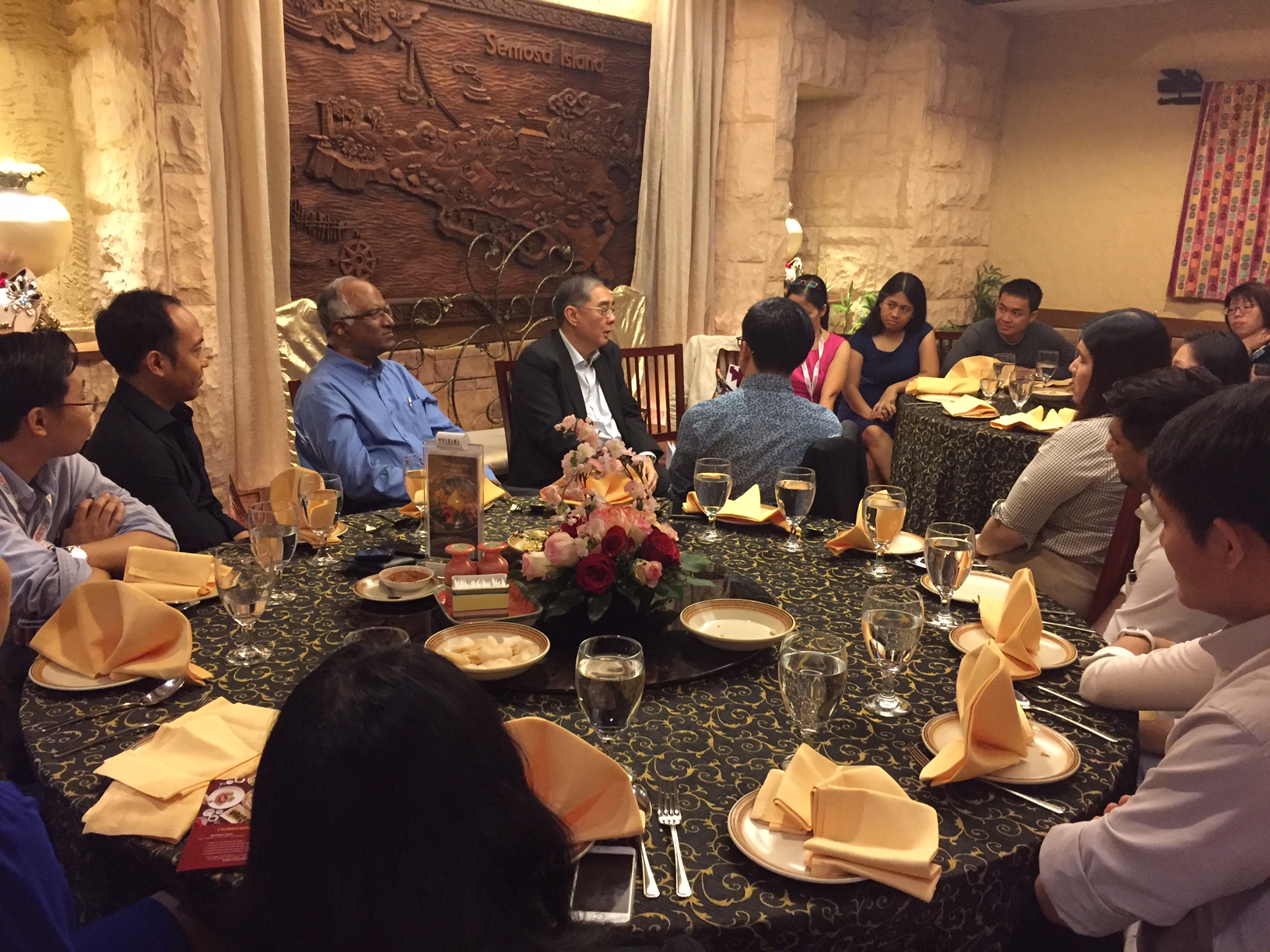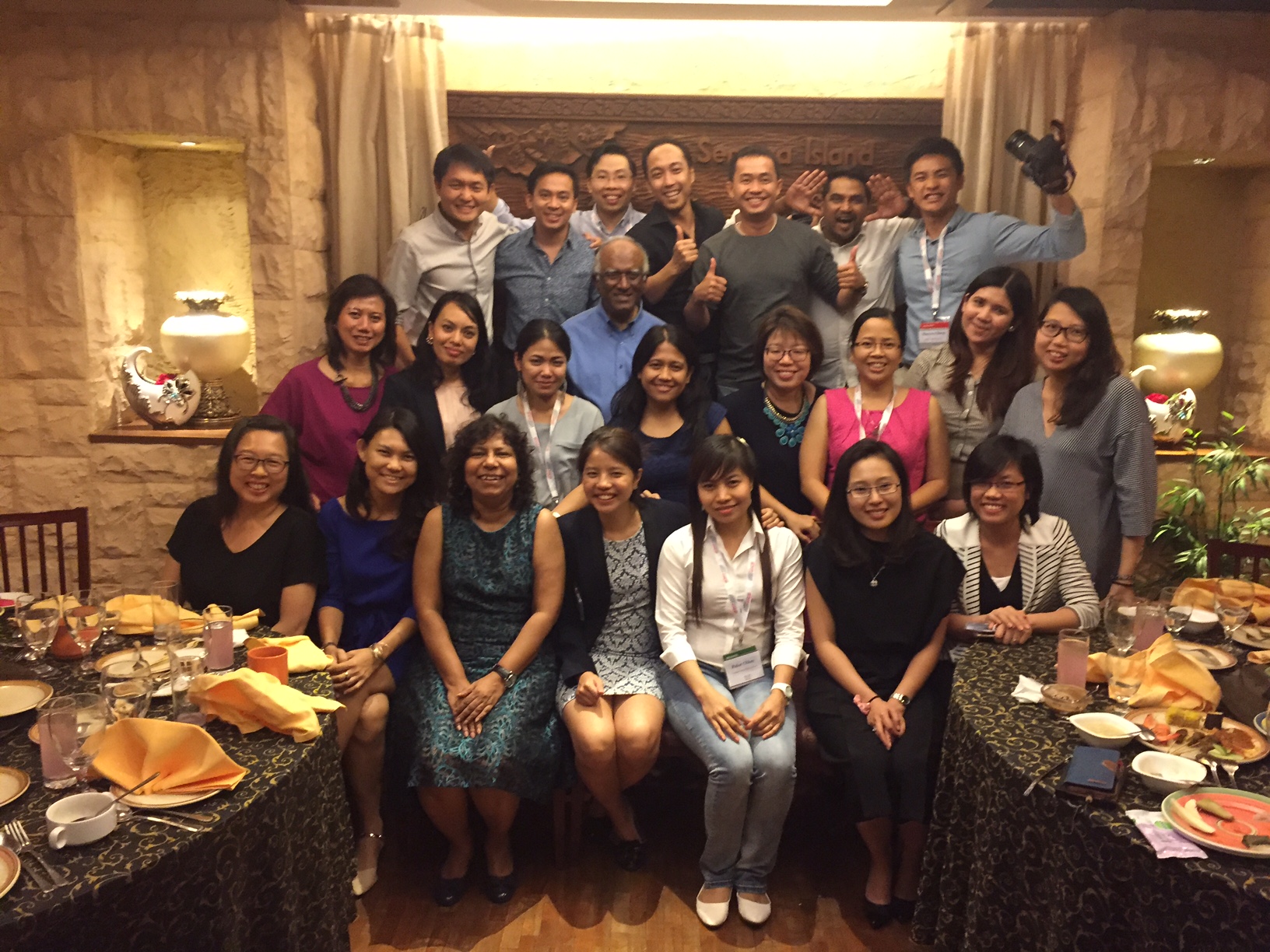Others
Singapore - Module 1 of the ASEAN CSR Fellowship (2017)
ACN launched its inaugural ASEAN CSR Fellowship on 9 Jan 2017. 15 Fellows were selected to participate in the Fellowship, featuring a series of study tours - starting in Singapore - to meet business leaders, government officials, academics, and civil society practitioners on key topics in responsible business.
Highlights in Singapore:
- Closing dinner with Ambassador Ong Keng Yong (Former Secretary-General of ASEAN)
- Tour of the Singapore Parliament and witnessing a live sitting
- Business & Human Rights lecture at Singapore Management University (SMU)
- Business Integrity workshop at the National University Singapore (NUS) Business School
- Sharing by Hitachi on their commitment to human rights
- Panel discussion on migrant worker issues with the Manpower Ministry and civil society groups
- Learning about impact investment from the Asian Venture Philanthropy Network (AVPN)
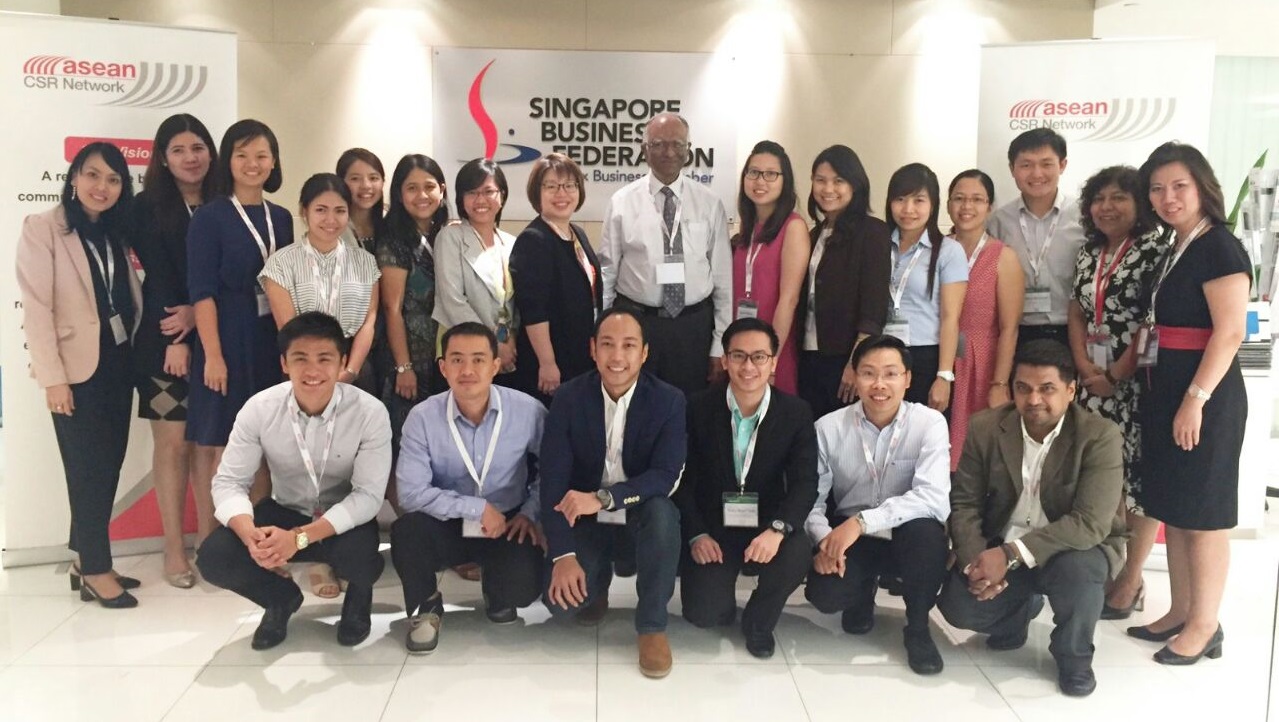
Inaugural batch of Fellows with staff of ASEAN CSR Network: (From L, top row) Philaiphone Vongpraseuth from Phousy Soles Group in Laos, Michelle Ong from Metro Bank Foundation in the Philippines, Irin Ng from Como Hotels & Resorts in Singapore, Vanida Khouangvichit from Village Focus International in Laos, Melissa Chong from ASEAN CSR Network (ACN), Dini Triyuni from WWF Indonesia, Nguyen Phuong Thao from ACN, Lydia Ang from CapitaLand in Singapore, Thomas Thomas from ACN, Ong Shiyun from the National Volunteer Philanthropy Centre in Singapore, Zin Mar Lwin from Norwegian People's Aid in Myanmar, Pidor Chhay from Transparency International Cambodia, Nguyen Thi Bich Hien from IUCN Vietnam, Sanva Saephan from KP Company in Laos, Braema Mathi from ACN, Ester Tjahjadi from ACN, Marcus Chong from ACN, Sambath Bun from G Gear Company in Cambodia, Aji Paramartha from KPMG Indonesia, Vo Ly Hoai Vinh from Coca-Cola Beverages Vietnam, Nguyen Dung Tien from the ILO-IFC Joint Programme on Better Work in Vietnam, and Selveraj A/L V Ramasamy from the Ministry of Foreign Affairs Malaysia.
Day 1 (9 Jan 2017) - Understanding Singapore
The Fellowship kicked off with an introduction of Global Compact Network Singapore (GCNS) and ASEAN CSR Network. Fellows also took time to learn about each other's work back in their home countries.
Before meeting in Singapore, Fellows completed an online CSR programme created by the University of Nottingham, in order to understand basic theoretical principles and case studies of CSR in practice. A workshop was then held where Fellows broke into small groups to share their key learning outcomes from the online module, discussing the following key question: "What are the enablers and barriers to promoting CSR in ASEAN?". Some of the common 'enablers' shared were government policies and buy-in from top management, while a common 'barrier' was the profit-at-all-cost motive of many companies.
In the afternoon, Fellows paid a visit to Singapore's Old and New Parliaments, which presented an opportunity to understand Singapore's unique strength in robust policy-making in order to foster trust from the business community. A Parliament guide introduced the Fellows to Singapore's Westminster Parliamentary system and answered queries on how the main policy-making body functions in Singapore. The visit coincided with a Parliament sitting on the day and Fellows sat in a live debate on the Securities & Futures Bill. After the tour of Parliament, Fellows attended a book launch held at the Lee Kuan Yew School of Public Policy (LKYSPP), involving a panel discussion with Mr Jonathan Tepperman, Managing Editor of Foreign Affairs, and Prof Kishore Mahbubani, Dean of LKYSPP. The book was titled "The Fix: How Nations Survive and Thrive in a World of Decline", and Fellows gained insights on the pertinent issues in global politics today and how it might affect CSR.
Day 2 (10 Jan 2017) - Business & Human Rights
On Day 2, Fellows spent the day at Singapore Management University (SMU)'s School of Law to understand how businesses ought to protect and respect human rights, starting with a classroom session with Prof Mahdev Mohan (Assistant Professor of Law & Director, Asian Business and Rule of Law Initiative, SMU). He shared common theoretical concepts such as the UN Guiding Principles on Business and Human Rights, as well as case studies from Cambodia and Singapore. This was followed by a presentation by one of ACN's corporate partners - Hitachi Asia - represented by Christian Bustamante (Sustainability Manager), who shared with the Fellows on Hitachi's commitment to Human Rights. Valuable insights were shared on Hitachi's corporate policy, the timeline of its development, and how the policy was implemented over time.
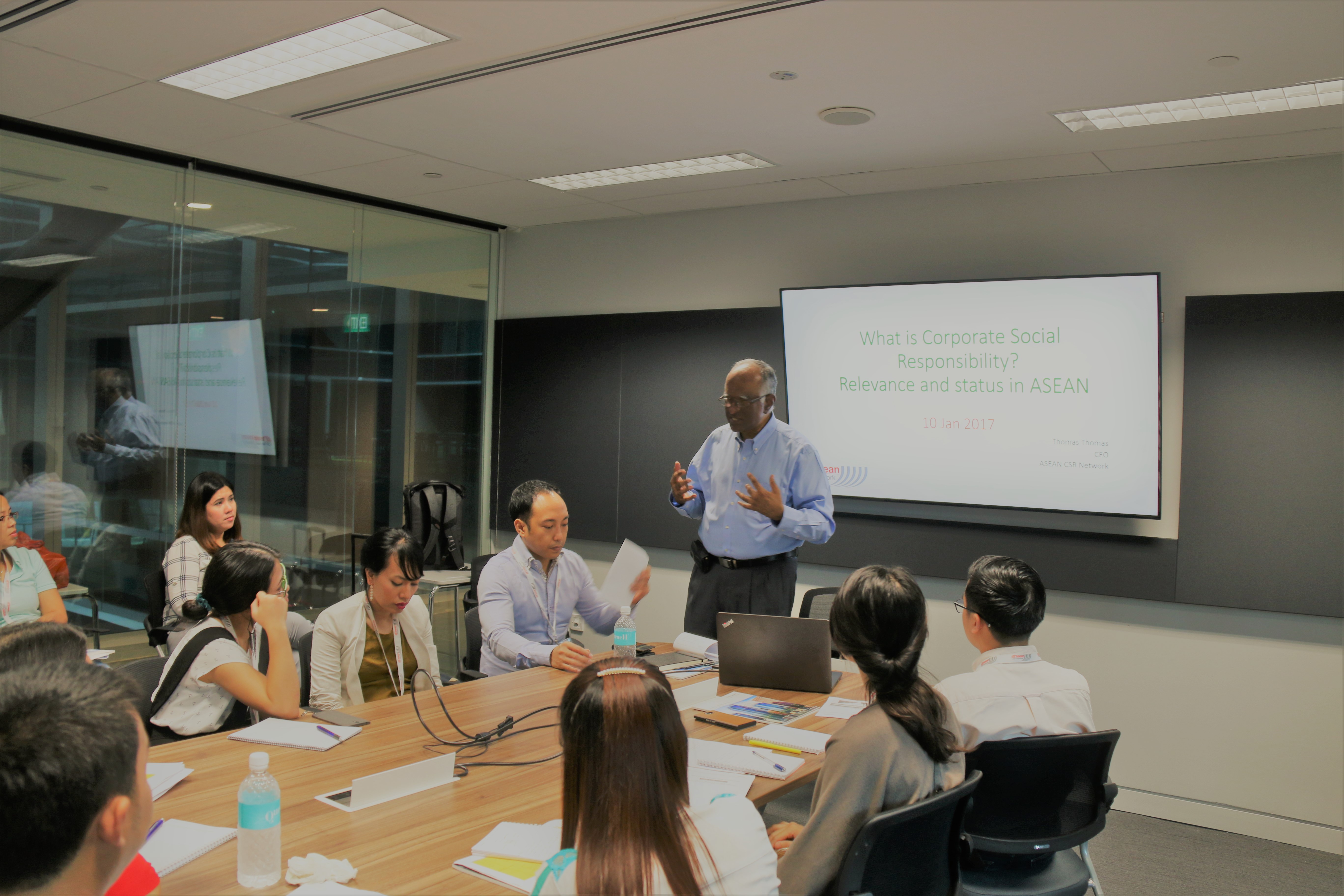
The day continued with Mr Thomas Thomas (CEO, ASEAN CSR Network) sharing an introductory presentation covering CSR and its relevance in ASEAN, including some of the key research reports conducted by ACN which identified areas of progress and gaps in ASEAN countries. A key question was also discussed: What is the business case for CSR? Why should businesses care about the triple bottom line in today's context?
This was followed by Ms Cynthia Morel (Expert Advisor of the Asian Business & Rule of Law Initiative) who shared her extensive research on land rights issues in ASEAN, particularly in the agribusiness & mining industries.
Day 3 (11 Jan 2017) - Governance in Businesses
Day 3's focus was on business integrity, corporate governance and compliance - held at the National University of Singapore (NUS) Business School. Prof Lawrence Loh (Director of Centre of Governance, Institutions and Organisations (CGIO)) started the session with an introduction to business ethics, posing the opening question: "Can Ethics be Taught?". Prof Lawrence then introduced philosophical frameworks to help Fellows solve dilemmas in decision-making, using the "Lifeboat Exercise" as an analogy. This included an introduction to the body of work from philosophers such as JS Mills, Immanuel Kant, John Rawls and Aristotle. He ended off by presenting the latest findings in a piece of research conducted together with ACN, focusing on the state of corporate disclosure by the largest 50 companies in Indonesia, Malaysia, Philippines, Singapore and Thailand.
The afternoon's learning focused on governance in practice, starting with Mr G Balasubramaniam who shared on the best practices from his years of experience as a Compliance Advisor to top companies. This was followed by Mr Michael Lee from Singapore's anti-corruptions bureau - the Corruption Practices Investigations Bureau (CPIB) - providing insights on how Singapore has maintained its integrity culture.
Day 4 (12 Jan 2017) - Migrant Workers & Labour Issues
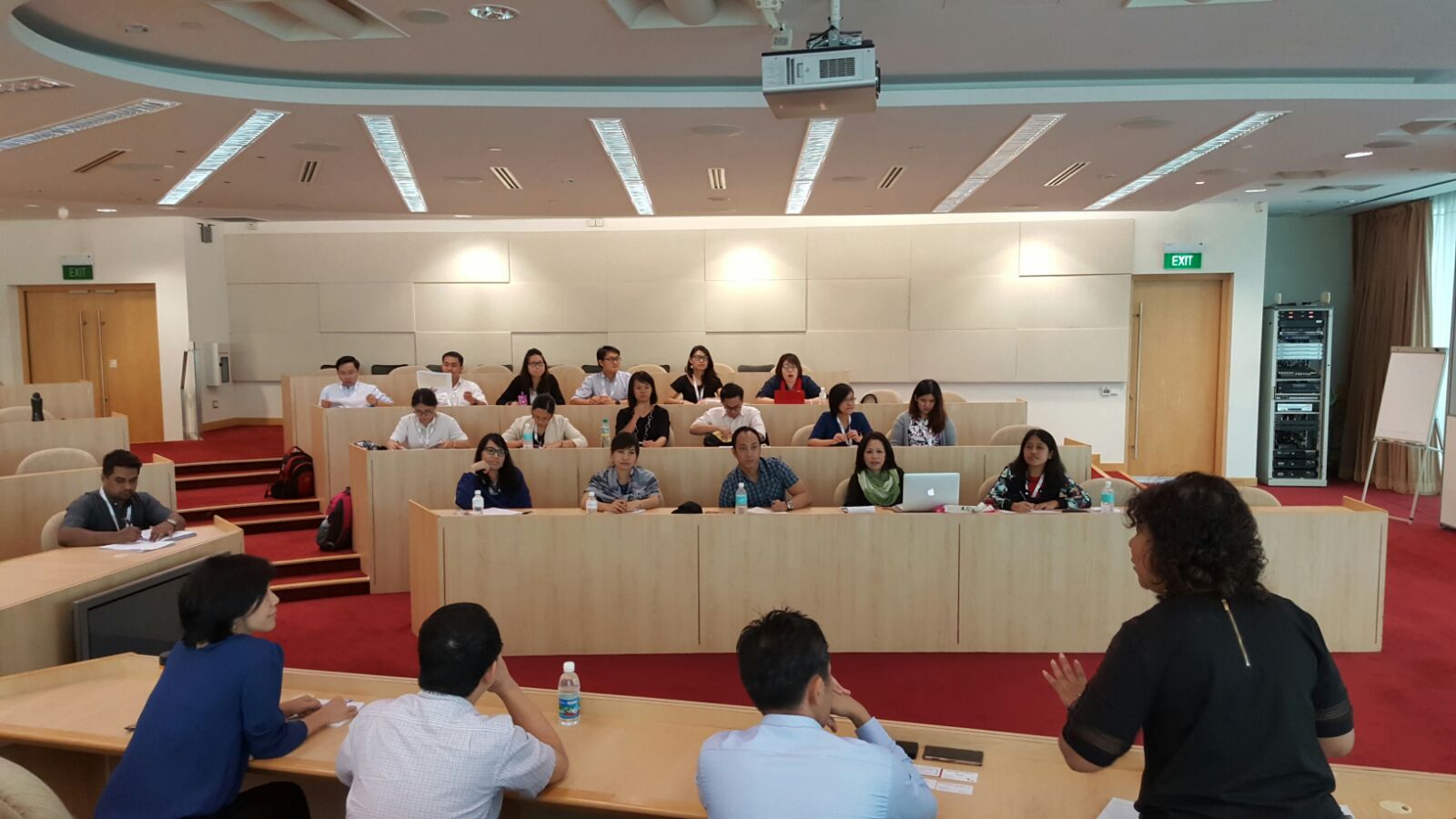
Day 4 featured a deep dive into issues surrounding migrant workers and labour. The aim was to help Fellows understand how the government and civil society groups in Singapore ensure migrant workers retain good relations with their employers, as well as the challenges faced in managing their wellbeing and enforcing their rights. The day started with a site visit to the Migrant Workers' Centre (MWC), an NGO which champions fair employment practices. Their Executive Director, Mr Bernard Menon, shared about the migrant worker landscape in Singapore, including the fact that more than a third of Singapore's workforce were migrants from Bangladesh, Malaysia, China, Myanmar and other neighbouring countries. Following the site visit, a panel discussion was held with Mr Alex Au (Vice President, Transient Workers Count Too (TWC2), Ms Stephanie Chok (Researcher, Humanitarian Organisation for Migration Economics (HOME)) and Mr Chng Yi Ken (Senior Assistant Director, Foreign Manpower Unit, Workplace Policy & Strategy Division, Ministry of Manpower (MOM)). The main issue discussed was how these different organisations and agencies support migrant workers in Singapore, and manage the different demands and pressures from all stakeholders.
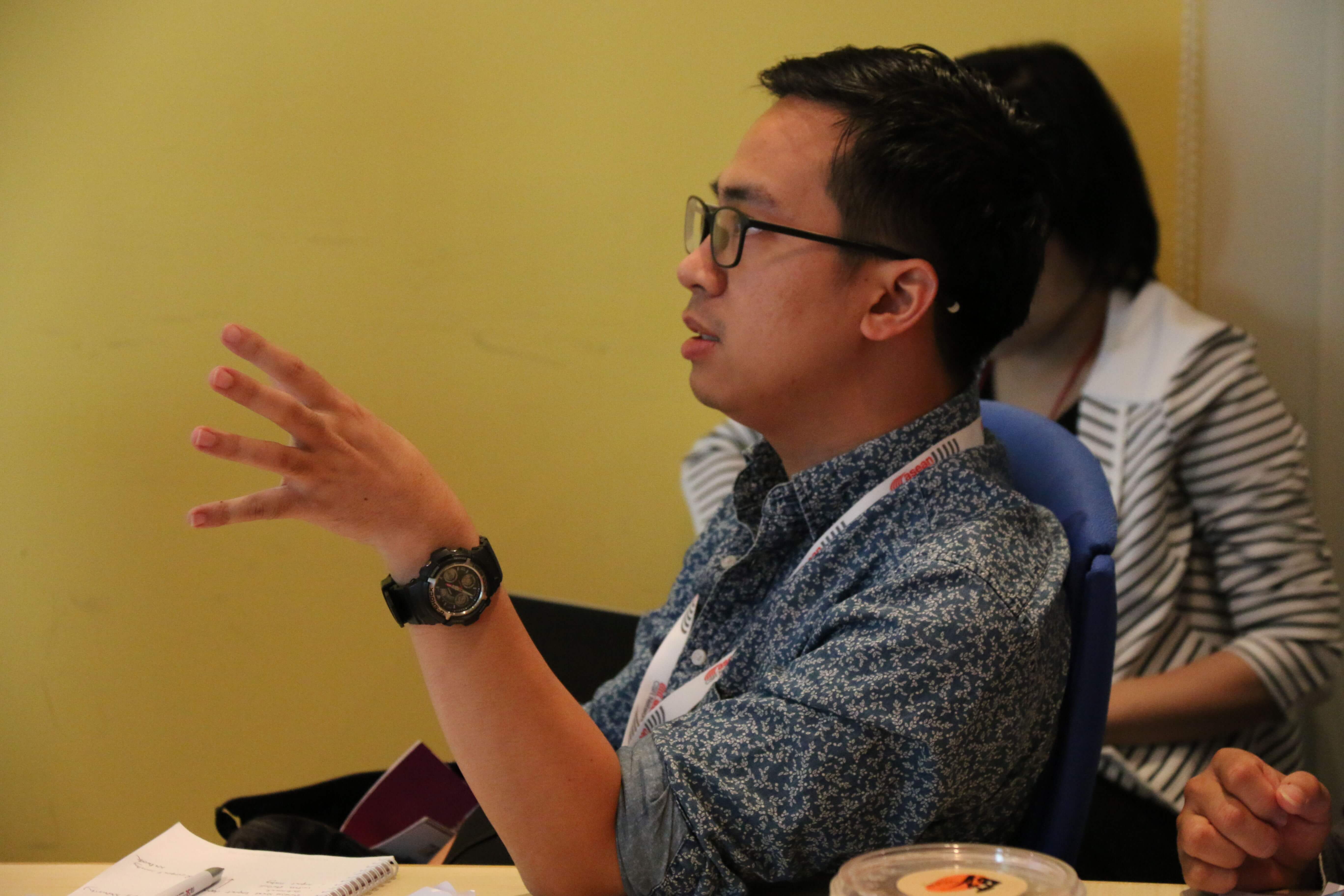
After lunch, another panel discussion took place to focus on Singapore’s labour movement and tripartite system, and how industrial relations is maintained through the various agencies. Panellists were representatives from Singapore's main agencies directed to manage labour relations in Singapore – Mr Frederick Ho (Deputy Director, International Affairs, National Trades Union Congress (NTUC)), Mr Tay Wee Yee, (Senior Manager, Singapore National Employers Federation (SNEF)) and Mr Lau Weng Hong (Deputy Director, Industrial Relations, MOM)). Discussions surrounded how government, trade unions and the private sector work hand in hand to maintain healthy labour relations and economic stability.
Day 5 (13 Jan 2017) - Social Enterprises & Impact Investment
The final day of the Fellowship focused on Singapore's social enterprise and impact investment space, and Fellows made a site visit to the Singapore Centre for Social Enterprises (raiSE). Ms Lyn Chen from Research & Strategy at raiSE shared how companies could be involved in the social good movement through social innovation - for example, by investing in new products and processes with a potential to create social impact. This was followed by a presentation by Ms Mythili Mamidanna from DBS Foundation who shared about the bank foundation's mandate to support social enterprises in Singapore through grants, consultancy services and dedicated programmes.
The visit to raiSE was folllowed by lunch at Eighteen Chefs - a restaurant chain founded by an ex-convict, which now hires a large team of ex-convicts to operate its 12 outlets nationwide. The social enterprise hopes to find alternative ways to help youths and ex-convicts reintegrate back into society, while providing them a platform for them to realise their talents in the F&B industry. One of the Fellows, Ms Lydia Ang, also gave an impromptu tour of the mall as the Sustainability Manager of CapitaLand.
After lunch, Fellows heard from Asian Venture Philanthropy Network (AVPN), one of the first and leading players in Singapore's social investment space. Mr Kelvin Teo, Managing Director of the AVPN Knowledge Centre, shared on the progress, challenges and opportunities for social investment in ASEAN. He explained that social investing was a relatively new but exciting industry, involving the financing of social enterprises, encompassing types of investment such as venture philanthropy and impact investment.
This was followed by a presentation from Mr Wilson Ang (Executive Director, Global Compact Network Singapore (GCNS)), who wrapped up the final session by providing an overview of the CSR landscape in Singapore, including the trends, opportunities and challenges faced by companies in adopting CSR.
The day ended with a debrief and sharing by the Fellows on the key learning points gathered during the Fellowship. To close the 5-day learning journey, a dinner was hosted at Furama Riverfront Hotel with Ambassador Ong Keng Yong, former ASEAN Secretary-General, who shared his insights on how the responsible business agenda can be promoted in the region.
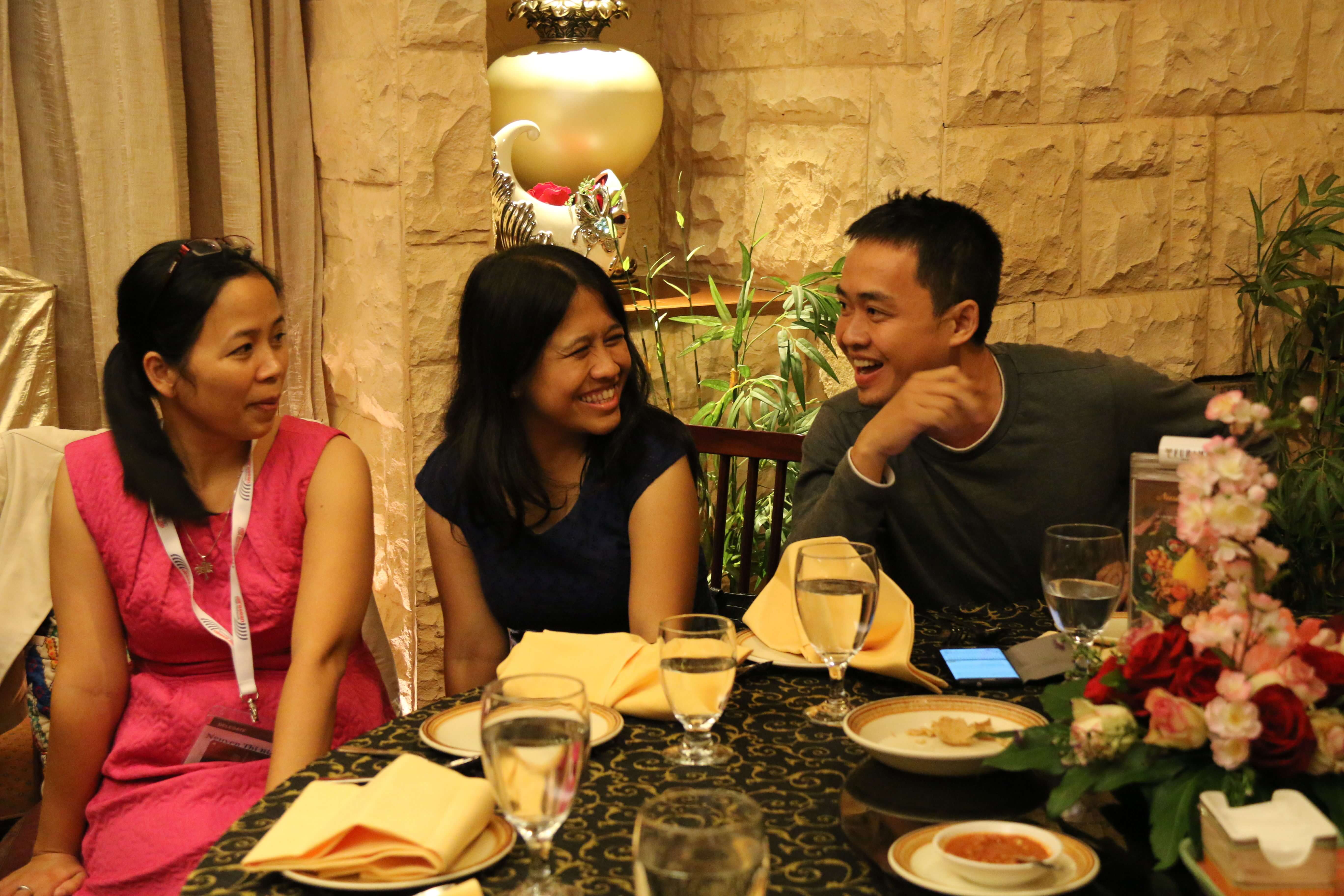
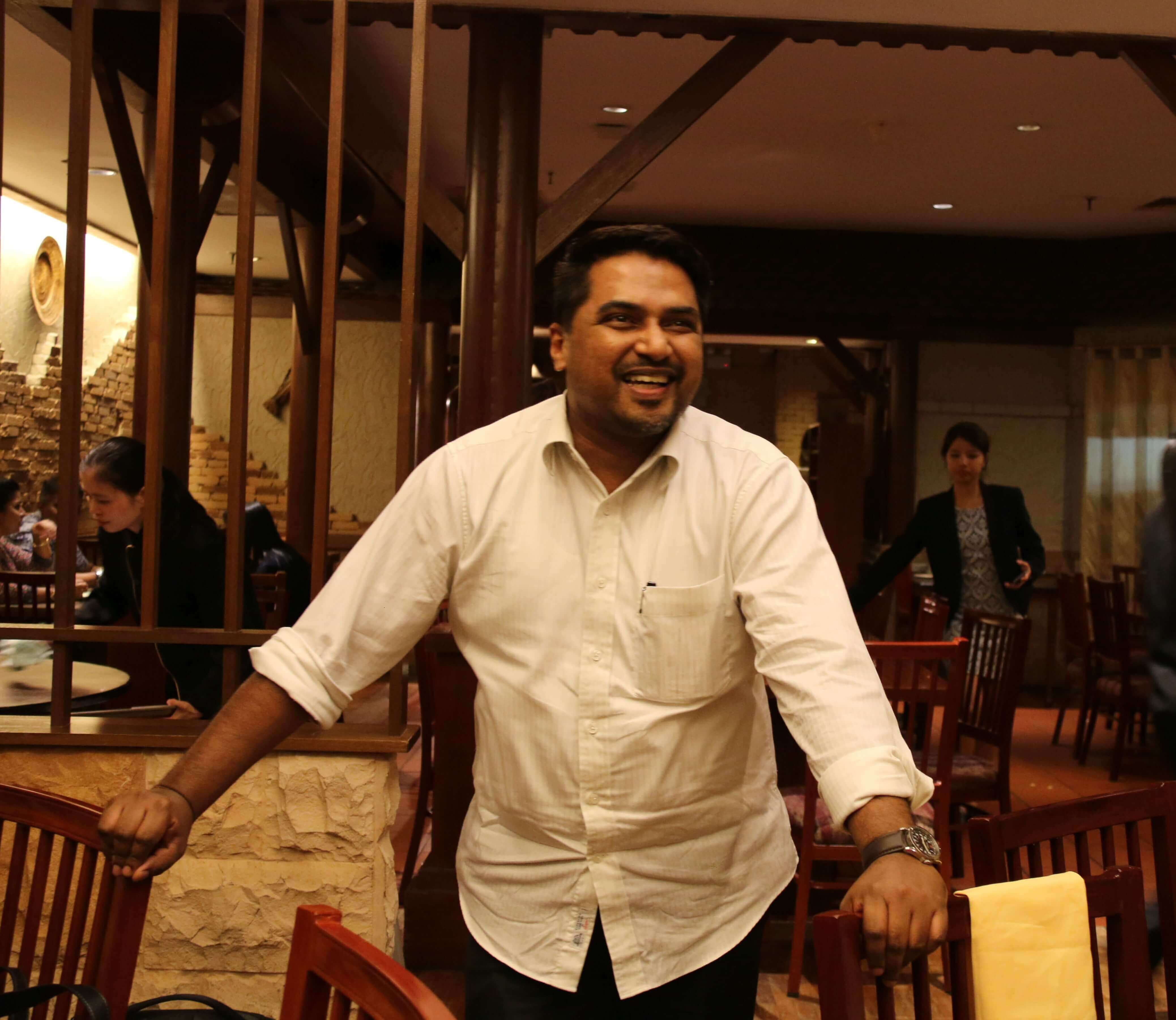
Dinner and conversations with Ambassador Ong Keng Yong, former ASEAN Secretary-General, on where ASEAN is heading with regards to responsible business practices
ASEAN CSR Fellowship 2017
ACN launched its inaugural ASEAN CSR Fellowship on 9 Jan 2017 with 15 Fellows from 8 ASEAN countries (Cambodia, Indonesia, Laos, Malaysia, Myanmar, the Philippines, Singapore, Vietnam).
This programme aims to deepen cross-border perspectives and build up the next generation of CSR leaders for responsible business in Southeast Asia, harnessing their potential to address key regional issues in business & anti-corruption, business & human rights, and food security & sustainable agriculture. Fellows were selected to participate in a series of study tours to meet business leaders, government officials, academics, and civil society practitioners.
The programme began in Singapore in Jan 2017, followed by visits to 3 other ASEAN countries in April, July and Sept. All Fellows were partially sponsored with the support of the Government of Sweden, the National Youth Council Singapore and the UK Foreign and Commonwealth Office.
ABOUT THE FELLOWSHIP PROFILES OF THE FELLOWS (CLASS OF 2017)
SINGAPORE INDONESIA MYANMAR PHILIPPINES

Class of 2017:
- Aji Paramartha - Senior Manager, People Performance & Culture, KPMG Indonesia (Indonesia)
- Dini Triyuni - Senior Grant Officer, WWF Indonesia (Indonesia)
- Selvaraj A/L V Ramasamy - Diplomatic & Administrative Officer (Principal Assistant Secretary), Ministry of Foreign Affairs (Malaysia)
- Lydia Ang - Senior Manager, Group Communications & CSR, Capitaland (Singapore)
- Michelle Ong - Program Coordinator, MetroBank Foundation (Philippines)
- Nguyen Dung Tien - Enterprise Advisor, ILO-IFC Joint Programme on Better Work (Vietnam)
- Nguyen Thi Bich Hien - Project Manager, Ha Long-Cat Ba Alliance Initiative, International Union for Conservation of Nature (Vietnam)
- Philaiphone Vongpraseuth - Managing Director, Phousy Group Sole (Laos)
- Pidor Chhay - Business Integrity Senior Programme Officer, Transparency International (Cambodia)
- Quek Shiyun - Assistant Director, Corporate Giving & Lead, National Volunteer and Philanthropy Centre (Singapore)
- Sambath Bun - Assistant to CEO, G Gear Company (Cambodia)
- Sanva Saephan - General Manager, Business Development, KP Lao (Laos)
- Vanida Khouangvichit - Private Sector Engagement, Village Focus International (Laos)
- Vo Ly Hoai Vinh - Sustainability Officer, Coca-Cola Beverages Vietnam (Vietnam)
- Zin Mar Lwin - International Finance Manager, Norwegian People's Aids (Myanmar)
Resource Contributor
The Fellowship will be conducted with the support of resource persons / institutions in government, business, academic and civil society sectors. Resource contributors of the ASEAN CSR Fellowship in 2017 included:
| Country | Partners |
| Singapore |
Global Compact Network Singapore (GCNS) Singapore Management University (SMU) – Asian Business & Rule of Law Initiative (ABRLI) National University of Singapore (NUS) Business School – Centre for Governance, Institutions and Organisations (CGIO) Hitachi Asia Corrupt Practices Investigations Bureau (CPIB) Migrant Workers’ Centre (MWC) Humanitarian Organisation for Migration Economics (HOME) Transient Workers Count Too (TWC2) Ministry of Manpower (MOM) National Trades Union Congress (NTUC) Singapore National Employers Federation (SNEF) Singapore Centre for Social Enterprises (raiSE) DBS Foundation Asian Venture Philanthropy Network (AVPN) Closing Dinner: Ambassador Ong Keng Yong, former ASEAN Secretary-General |
| Indonesia |
Indonesia Business Links (IBL) ASEAN Secretariat ASEAN Foundation Vale Indonesia Oxfam Indonesia Telkomtelstra Indonesia Chamber of Commerce and Industry APRIL-RAPP Unilever Foundation Danone Closing Dinner: Mr. Rafendi Djamin, former representative of Indonesia to the ASEAN Intergovernmental Committee on Human Rights |
| Myanmar |
Union of Myanmar Federation of Chambers of Commerce & Industry Global Compact Network Myanmar Myanmar Investment Commission First Myanmar Investment Company TOTAL YOMA Strategic Holdings Group General Electric Gender Equality Network Myanmar Centre for Responsible Business Myanmar Responsible Tourism Institute Best Garment Coca-Cola
|
| Philippines |
League of Corporate Foundations (LCF) SM Foundation Aboitiz Foundation Zuellig Family Foundation Asian Institute of Management (AIM) Jollibee Group Foundation San Roque Corporation ASEAN Business Advisory Council (ASEAN-BAC) National Economic Development Authority (NEDA) Philippine Economic Zone Authoirty (PEZA) Ramon Magsaysay Awards CEMEX Philippines for Asia Closing Dinner: H.E. Leo Herrera-Lim, Chair, ASEAN Intergovernmental Commission on Human Rights |
WHAT OUR FELLOWS HAD TO SAY ABOUT THE ASEAN CSR FELLOWSHIP |
|
"My key takeaway from this program is that when it comes to doing good and doing well, the work never stops. As a young CSR practitioner, this journey opened my eyes to stark realities - great challenges that we all face, whichever sector we are in, whichever country we are at. But more importantly, what I realized is that the opportunities are greater - way greater - than the challenges, only if we take on a positive and collaborative lens on how we want to see and do things. CSR is not just the business of businesses. It is the business of all of us - the private sector, the government, and the civil society. For CSR to gain more global relevance and become one of the vehicles to attain sustainable development, it has to be collaborative, aggressive, and ever-changing. This is something I definitely want to impress to my colleagues when I get back home - that as CSR practitioners, we must continue to make ourselves relevant, no matter how successful we think our program already are. Innovate if we must and change if necessary. And particularly for Southeast Asia, allow me to borrow the words of Prime Minister Najib Razak in one of his speeches: we need to complete each other, not compete with each other" - Michelle Ong, Metrobank Foundation (Philippines) |
| "Since I’m not from the private sector and have very limited background knowledge on how businesses operate in general, this fellowship really provided me with the opportunity to learn about different industries – not just in theory but also in practice. I realized that CSR really requires cooperation and that multi-stakeholder dialogues is an essential factor to create the common ground." - Vanida Khouangvichit, Village Focus International (Laos) |
| "Like other fellows, I return to my home country after each module with a lot of publications in our luggage and ideas in our head. What I appreciate from the fellowship is not only the overview of CSR initiatives in ASEAN, but also the unique chance to witness how things are progressing at the national and local level in the countries that we've been to. This broadens my perspectives and helps in my future engagements in the field." - Dung Tien, IFC-ILO Joint Programme on Better Work (Vietnam) |
| "The ASEAN CSR Fellowship has been very useful in helping me gain a deeper understanding of what sustainability and CSR is. Through the various dialogues with high-level business executives, government representatives and subject matter experts, we were able to obtain first-hand accounts of the opportunities and challenges of building a more sustainable and inclusive eco-system. One of the greatest take-aways for me from the programme is that every country faces similar difficulties in engaging companies, especially the small and medium enterprises (SMEs) to embark on sustainable business practices. I would look to leverage on the knowledge and contacts acquired from the programme to facilitate, bridge and deepen the CSR participation and involvement of companies in Singapore." - Quek Shiyun, National Volunteer Philanthropy Centre (Singapore) |
| "The most important thing I have learned from this Fellowship is a better understanding of the business evolution towards CSR in ASEAN. From my own perspective of environmental management, I have learned a useful approach of approaching environmental issues from a human rights perspective when working with business partners. I think I am now able to provide more practical advice to our business partners about what CSR activities that are relevant to their business value chain." - Thi Bich Hien, International Union for Conservation of Nature (Vietnam) |
| "I was exposed to best practices across the region on responsible practices that can definitely be implemented in the organization I am with, or future projects that I plan to take. I also got the chance to meet outstanding people who have done excellent work in the region, inspiring me to embark go further in my journey. Coming from the private sector, meeting different people had also given me completely new perspectives to view various issues and solutions." - Aji Paramartha, KPMG (Indonesia) |
| "I would highly recommend the Fellowship to anyone interested. The fellowship opens a huge door of knowledge – including challenges and opportunities, and inspire a hope that a strong ASEAN can move ahead, despite diverse local contexts. There are also opportunities for mentorship, as alumni can become mentors for the new batch of Fellows." - Vo Ly Vinh, Coca-Cola (Vietnam) |
Disclaimer
All documents and information on the Singapore Compact website are protected by copyright. Except as specifically permitted herein, no portion of the documents or information on this website may be reproduced in any form or by any means without the express written consent of the Singapore Compact.
Content & Liability Disclaimer
None of the information in this site should be relied upon as legal advice. Singapore Compact shall not be responsible for any errors or omissions contained on this web site or for any interruptions or delays in accessing or using this web site. Singapore Compact reserves the right to make changes to this web site at anytime without notice. Mention of non-Singapore Compact products or services, as well as links to third party sites or information, is provided for informational purposes only and constitutes neither an endorsement or a recommendation by Singapore Compact.
Singapore Compact is providing this site on an "as is" basis and makes no representations or warranties of any kind with respect to this site or its contents and disclaims all such representations and warranties. In addition, Singapore Compact makes no representations or warranties about the accuracy, completeness, or suitability for any purpose of the information and related graphics published in this site. The information contained in this site may contain technical inaccuracies or typographical errors. All liability of Singapore Compact howsoever arising for any such inaccuracies or errors is expressly excluded to the fullest extent permitted by law.
Neither Singapore Compact nor any of its directors, employees or other representatives will be liable for loss or damage arising out of or in connection with the use of this site. This is a comprehensive limitation of liability that applies to all damages of any kind, including (without limitation) compensatory, direct, indirect or consequential damages, loss of or damage to data, loss of income or profit, loss of or damage to property and claims of third parties, arising out of the use or inability to use this web site, this includes damages arising from use of or in reliance on the information present on this web site (including any information posted or placed by anyone other than Singapore Compact), even if Singapore Compact has been advised of the possibility of such damages.
Feedback Information
Any information provided to Singapore Compact in connection with this web site unless expressly indicated by Singapore Compact, shall be provided by the submitter and received by Singapore Compact on a non-confidential basis. Such information shall be considered non-confidential and property of Singapore Compact. By submitting any such information to Singapore Compact you agree to a no-charge assignment to Singapore Compact as all worldwide rights, title and interest in copyrights and other intellectual property rights to the information.
Trademarks
No permission is given by Singapore Compact in respect of the use of the Singapore Compact logo and name or other marks or names which are the trade marks, brand names, product names or copyrights of their respective holders. The unauthorized use of any of the marks or names on may constitute an infringement of the holder's rights.
Link to Third Party Sites
Singapore Compact prohibits the use of the Singapore Compact logo as a "hot" link to this web site unless the establishment of such a link is approved by Singapore Compact.
Singapore Compact websites may contain links to third party sites or resources. Access to any web site linked to this web site is not the responsibility of Singapore Compact and Singapore Compact is not responsible for the accuracy, or reliability of any content of such web sites. Singapore Compact provides these links merely for convenience and the presence of such third party links is not an endorsement or recommendation by Singapore Compact. Singapore Compact shall not be responsible for any damage or loss caused or alleged to be caused by or in connection with the use of or reliance on any such content available on or obtained through any such site or resource.
Non-related Sites
Third party sites are not part of Singapore Compact on the Web, and Singapore Compact has no control over the contents or availability of third party sites linked or referred to this web site.
Governing Law & Jurisdiction
This web site is controlled by Singapore Compact from its registered office in Singapore. All matters relating to your access to, or use of this web site shall be governed by Singapore law.
Any legal action or proceeding relating to you access to or use of this web site shall be instituted in a Singapore Court. You and Singapore Compact agree to submit to the jurisdiction of, and agree that the venue is proper in these courts in any such legal action or proceeding. You may not access, download, use or export information (including any software, products or services) contained on this web site in violation of any Singapore Laws or regulations.
The failure of Singapore Compact to enforce or exercise any of the provisions or rights under these Terms and Conditions shall not constitute a waiver of such a right or provision. If any provision of these Terms and Conditions is found invalid by a court of competent jurisdiction, that provision shall be enforced to the maximum extent permissible so as to effect the intention of the parties, and the remainder of these Terms and Conditions shall continue in full force and effect.

